Protection of Consumers' Rights in Bangladesh
VerifiedAdded on 2021/09/08
|22
|5581
|96
AI Summary
Contribute Materials
Your contribution can guide someone’s learning journey. Share your
documents today.
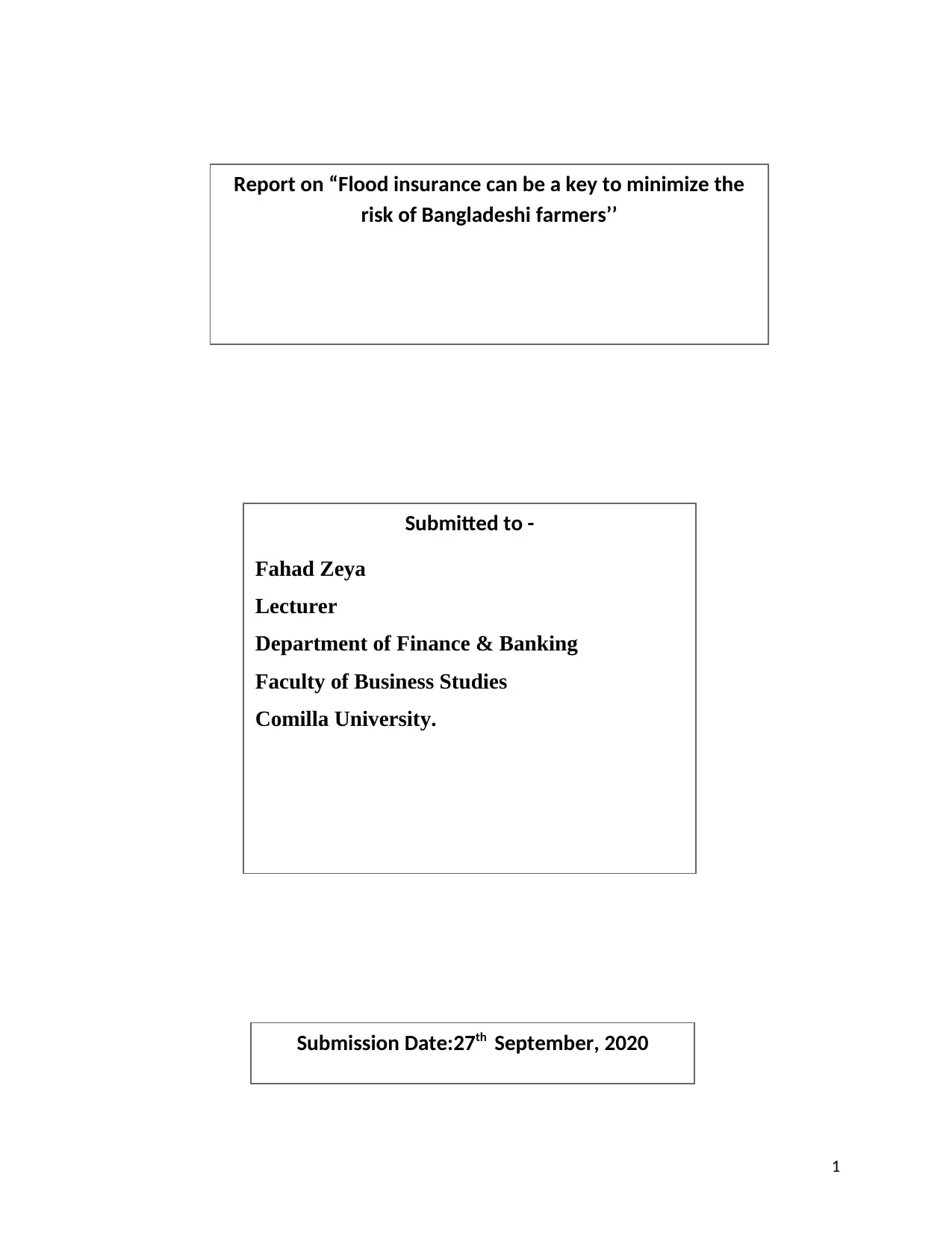
1
Report on “Flood insurance can be a key to minimize the
risk of Bangladeshi farmers’’
Submitted to -
Fahad Zeya
Lecturer
Department of Finance & Banking
Faculty of Business Studies
Comilla University.
Submission Date:27th September, 2020
Report on “Flood insurance can be a key to minimize the
risk of Bangladeshi farmers’’
Submitted to -
Fahad Zeya
Lecturer
Department of Finance & Banking
Faculty of Business Studies
Comilla University.
Submission Date:27th September, 2020
Secure Best Marks with AI Grader
Need help grading? Try our AI Grader for instant feedback on your assignments.
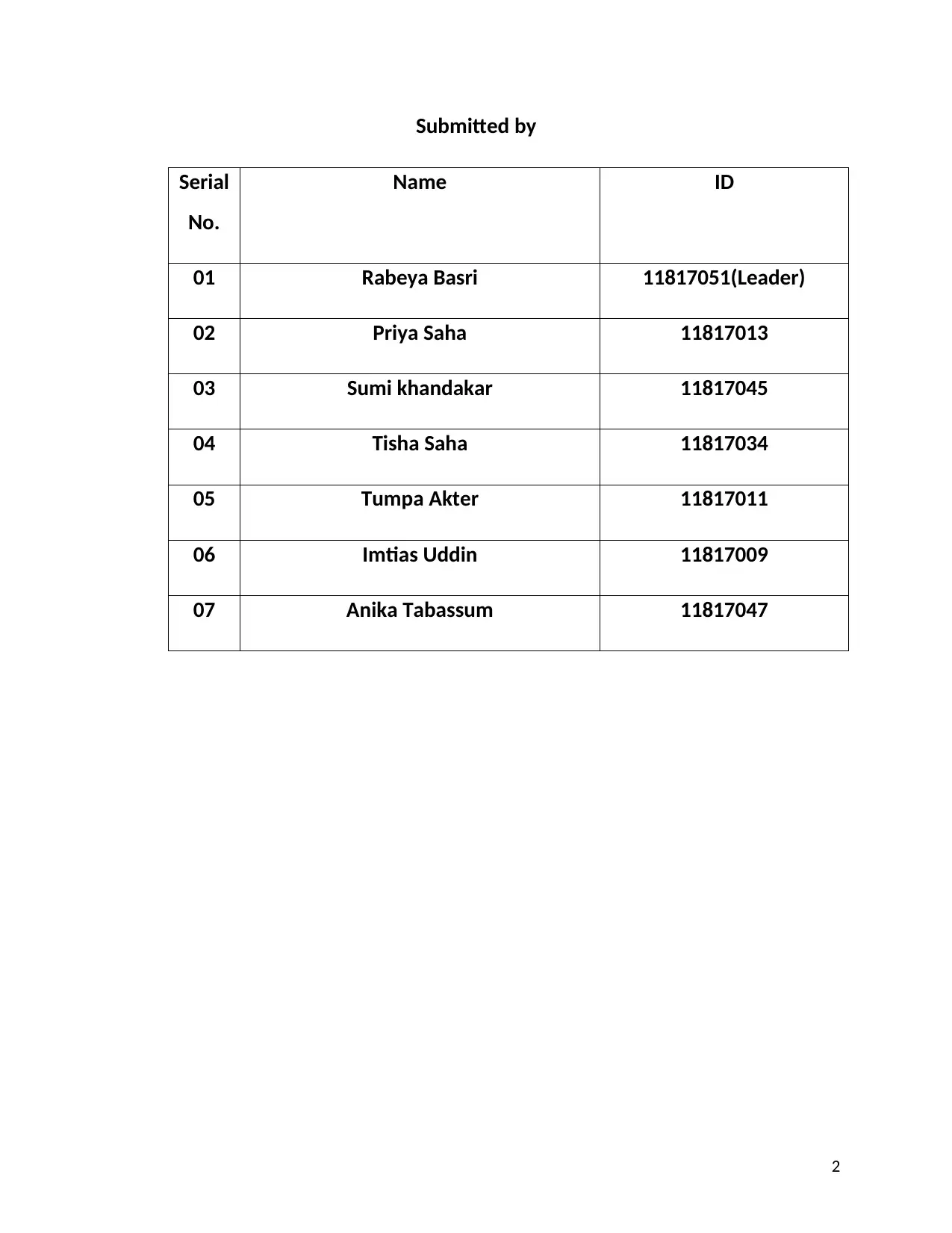
Submitted by
Serial
No.
Name ID
01 Rabeya Basri 11817051(Leader)
02 Priya Saha 11817013
03 Sumi khandakar 11817045
04 Tisha Saha 11817034
05 Tumpa Akter 11817011
06 Imtias Uddin 11817009
07 Anika Tabassum 11817047
2
Serial
No.
Name ID
01 Rabeya Basri 11817051(Leader)
02 Priya Saha 11817013
03 Sumi khandakar 11817045
04 Tisha Saha 11817034
05 Tumpa Akter 11817011
06 Imtias Uddin 11817009
07 Anika Tabassum 11817047
2
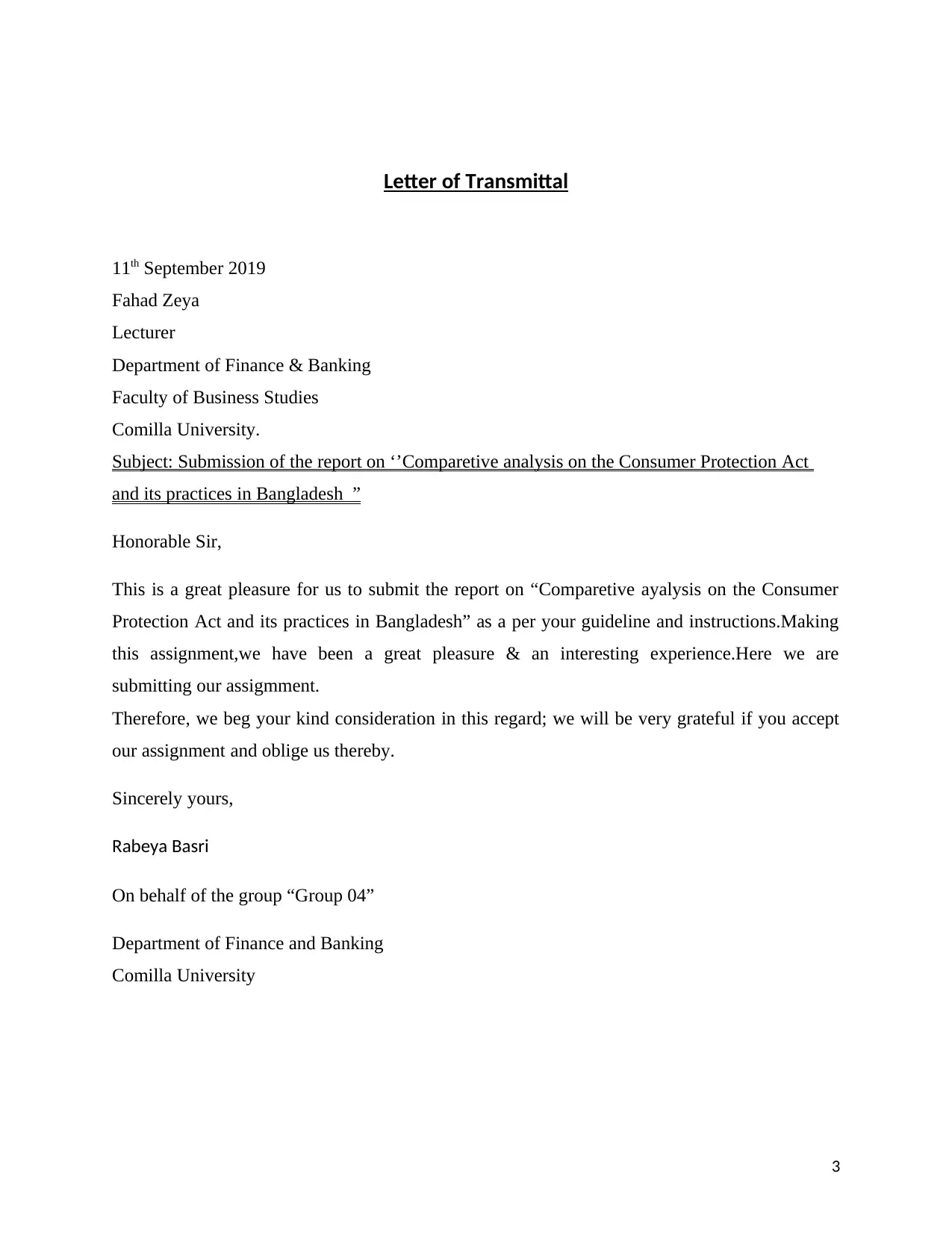
Letter of Transmittal
11th September 2019
Fahad Zeya
Lecturer
Department of Finance & Banking
Faculty of Business Studies
Comilla University.
Subject: Submission of the report on ‘’Comparetive analysis on the Consumer Protection Act
and its practices in Bangladesh ”
Honorable Sir,
This is a great pleasure for us to submit the report on “Comparetive ayalysis on the Consumer
Protection Act and its practices in Bangladesh” as a per your guideline and instructions.Making
this assignment,we have been a great pleasure & an interesting experience.Here we are
submitting our assigmment.
Therefore, we beg your kind consideration in this regard; we will be very grateful if you accept
our assignment and oblige us thereby.
Sincerely yours,
Rabeya Basri
On behalf of the group “Group 04”
Department of Finance and Banking
Comilla University
3
11th September 2019
Fahad Zeya
Lecturer
Department of Finance & Banking
Faculty of Business Studies
Comilla University.
Subject: Submission of the report on ‘’Comparetive analysis on the Consumer Protection Act
and its practices in Bangladesh ”
Honorable Sir,
This is a great pleasure for us to submit the report on “Comparetive ayalysis on the Consumer
Protection Act and its practices in Bangladesh” as a per your guideline and instructions.Making
this assignment,we have been a great pleasure & an interesting experience.Here we are
submitting our assigmment.
Therefore, we beg your kind consideration in this regard; we will be very grateful if you accept
our assignment and oblige us thereby.
Sincerely yours,
Rabeya Basri
On behalf of the group “Group 04”
Department of Finance and Banking
Comilla University
3
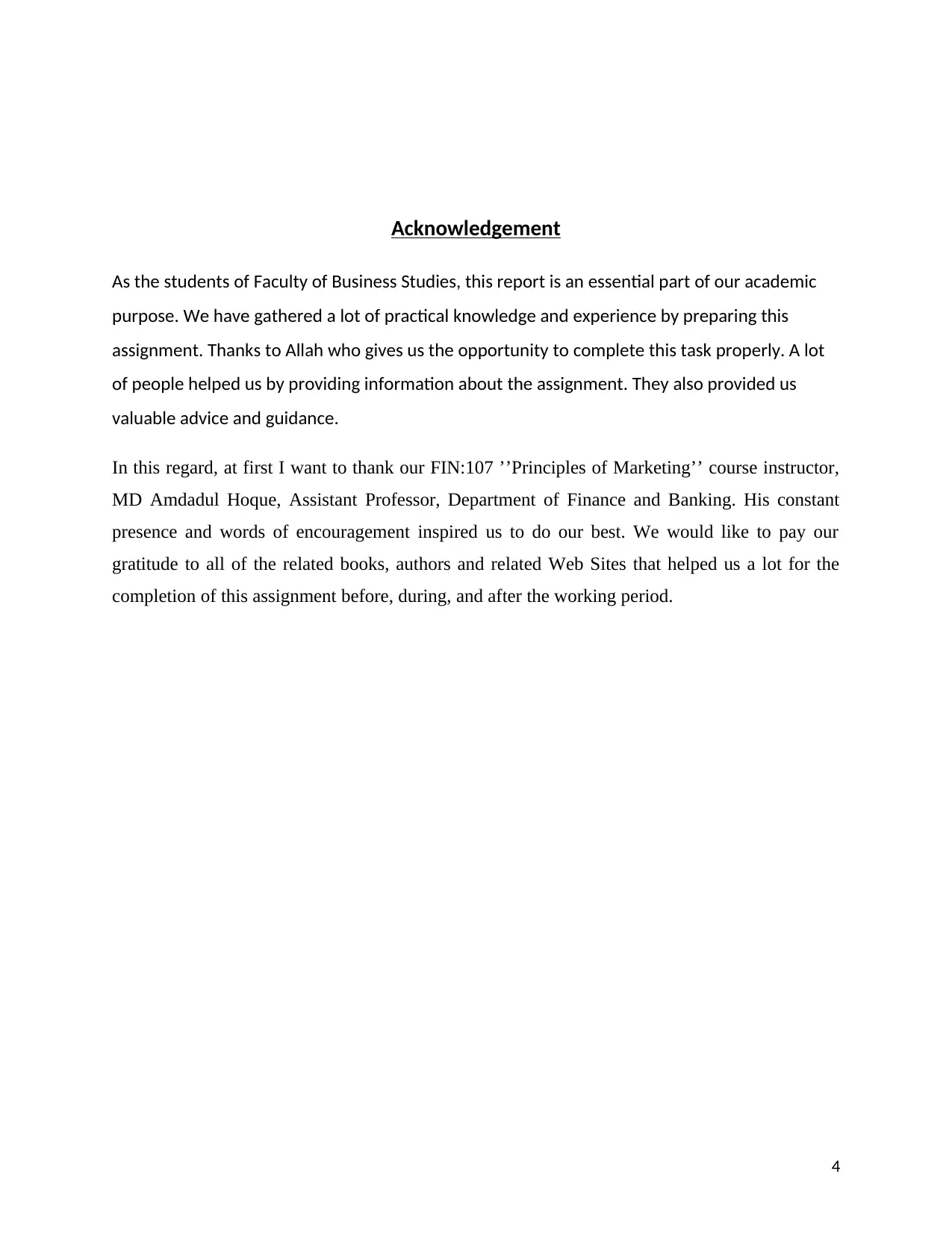
Acknowledgement
As the students of Faculty of Business Studies, this report is an essential part of our academic
purpose. We have gathered a lot of practical knowledge and experience by preparing this
assignment. Thanks to Allah who gives us the opportunity to complete this task properly. A lot
of people helped us by providing information about the assignment. They also provided us
valuable advice and guidance.
In this regard, at first I want to thank our FIN:107 ’’Principles of Marketing’’ course instructor,
MD Amdadul Hoque, Assistant Professor, Department of Finance and Banking. His constant
presence and words of encouragement inspired us to do our best. We would like to pay our
gratitude to all of the related books, authors and related Web Sites that helped us a lot for the
completion of this assignment before, during, and after the working period.
4
As the students of Faculty of Business Studies, this report is an essential part of our academic
purpose. We have gathered a lot of practical knowledge and experience by preparing this
assignment. Thanks to Allah who gives us the opportunity to complete this task properly. A lot
of people helped us by providing information about the assignment. They also provided us
valuable advice and guidance.
In this regard, at first I want to thank our FIN:107 ’’Principles of Marketing’’ course instructor,
MD Amdadul Hoque, Assistant Professor, Department of Finance and Banking. His constant
presence and words of encouragement inspired us to do our best. We would like to pay our
gratitude to all of the related books, authors and related Web Sites that helped us a lot for the
completion of this assignment before, during, and after the working period.
4
Secure Best Marks with AI Grader
Need help grading? Try our AI Grader for instant feedback on your assignments.
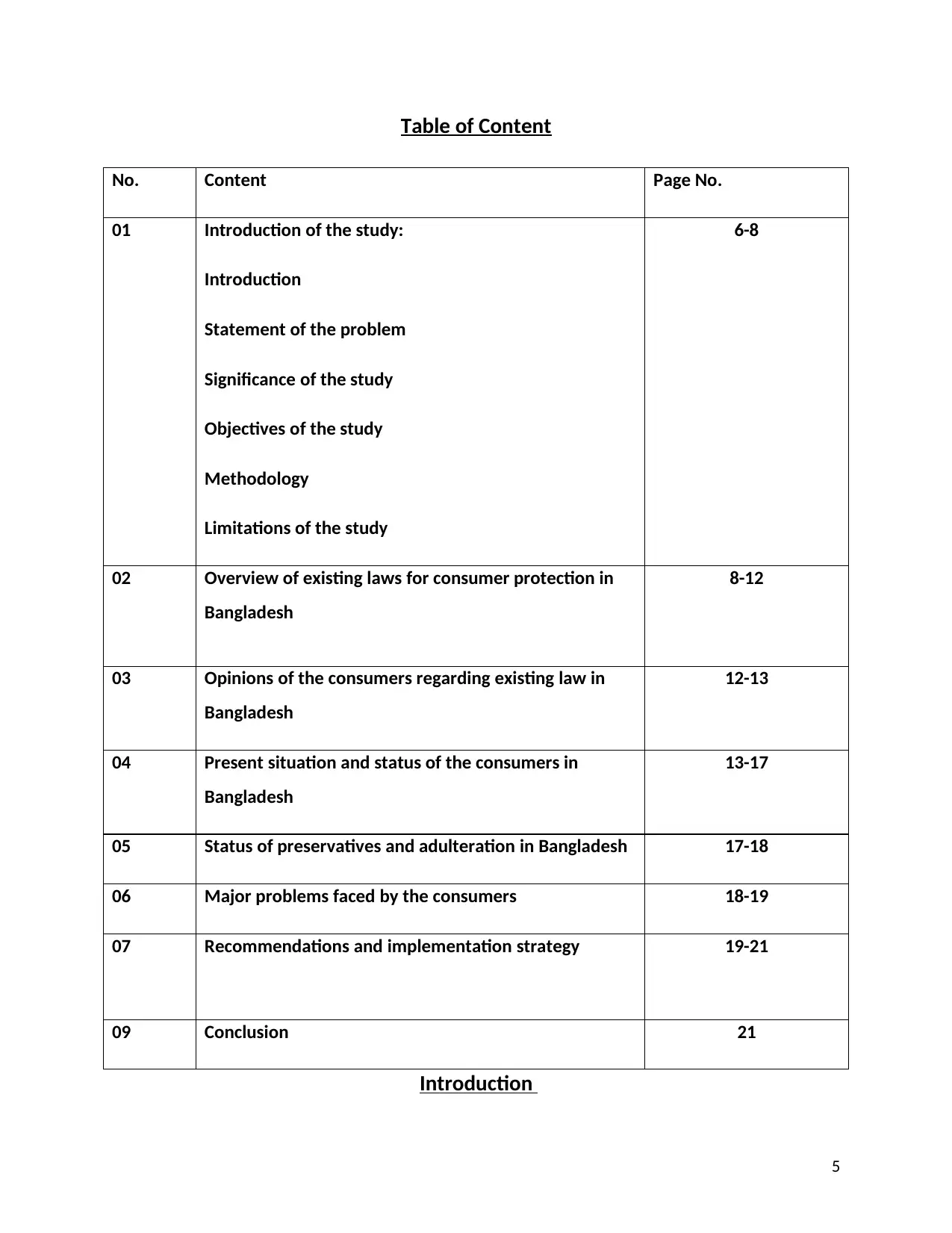
Table of Content
No. Content Page No.
01 Introduction of the study:
Introduction
Statement of the problem
Significance of the study
Objectives of the study
Methodology
Limitations of the study
6-8
02 Overview of existing laws for consumer protection in
Bangladesh
8-12
03 Opinions of the consumers regarding existing law in
Bangladesh
12-13
04 Present situation and status of the consumers in
Bangladesh
13-17
05 Status of preservatives and adulteration in Bangladesh 17-18
06 Major problems faced by the consumers 18-19
07 Recommendations and implementation strategy 19-21
09 Conclusion 21
Introduction
5
No. Content Page No.
01 Introduction of the study:
Introduction
Statement of the problem
Significance of the study
Objectives of the study
Methodology
Limitations of the study
6-8
02 Overview of existing laws for consumer protection in
Bangladesh
8-12
03 Opinions of the consumers regarding existing law in
Bangladesh
12-13
04 Present situation and status of the consumers in
Bangladesh
13-17
05 Status of preservatives and adulteration in Bangladesh 17-18
06 Major problems faced by the consumers 18-19
07 Recommendations and implementation strategy 19-21
09 Conclusion 21
Introduction
5
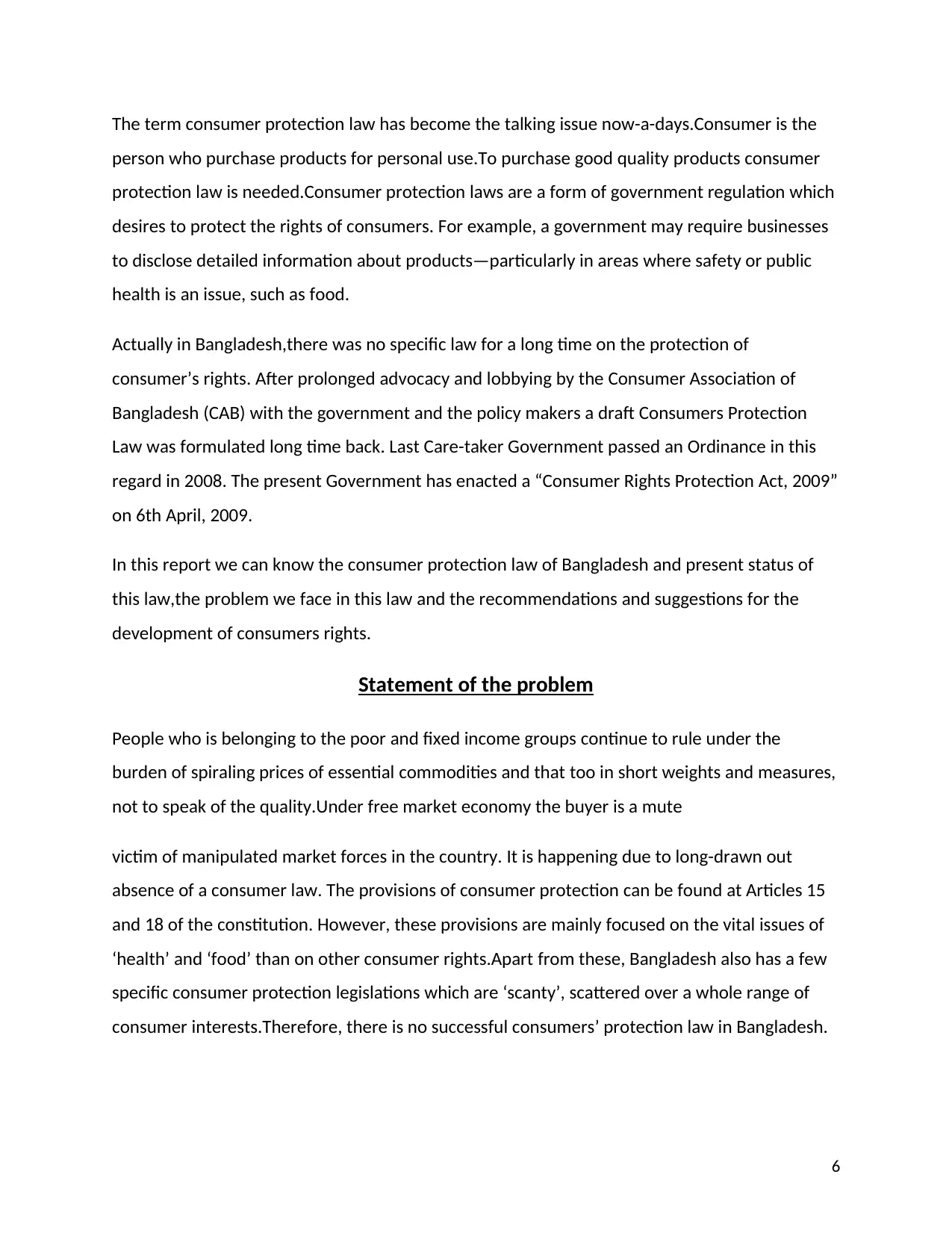
The term consumer protection law has become the talking issue now-a-days.Consumer is the
person who purchase products for personal use.To purchase good quality products consumer
protection law is needed.Consumer protection laws are a form of government regulation which
desires to protect the rights of consumers. For example, a government may require businesses
to disclose detailed information about products—particularly in areas where safety or public
health is an issue, such as food.
Actually in Bangladesh,there was no specific law for a long time on the protection of
consumer’s rights. After prolonged advocacy and lobbying by the Consumer Association of
Bangladesh (CAB) with the government and the policy makers a draft Consumers Protection
Law was formulated long time back. Last Care-taker Government passed an Ordinance in this
regard in 2008. The present Government has enacted a “Consumer Rights Protection Act, 2009”
on 6th April, 2009.
In this report we can know the consumer protection law of Bangladesh and present status of
this law,the problem we face in this law and the recommendations and suggestions for the
development of consumers rights.
Statement of the problem
People who is belonging to the poor and fixed income groups continue to rule under the
burden of spiraling prices of essential commodities and that too in short weights and measures,
not to speak of the quality.Under free market economy the buyer is a mute
victim of manipulated market forces in the country. It is happening due to long-drawn out
absence of a consumer law. The provisions of consumer protection can be found at Articles 15
and 18 of the constitution. However, these provisions are mainly focused on the vital issues of
‘health’ and ‘food’ than on other consumer rights.Apart from these, Bangladesh also has a few
specific consumer protection legislations which are ‘scanty’, scattered over a whole range of
consumer interests.Therefore, there is no successful consumers’ protection law in Bangladesh.
6
person who purchase products for personal use.To purchase good quality products consumer
protection law is needed.Consumer protection laws are a form of government regulation which
desires to protect the rights of consumers. For example, a government may require businesses
to disclose detailed information about products—particularly in areas where safety or public
health is an issue, such as food.
Actually in Bangladesh,there was no specific law for a long time on the protection of
consumer’s rights. After prolonged advocacy and lobbying by the Consumer Association of
Bangladesh (CAB) with the government and the policy makers a draft Consumers Protection
Law was formulated long time back. Last Care-taker Government passed an Ordinance in this
regard in 2008. The present Government has enacted a “Consumer Rights Protection Act, 2009”
on 6th April, 2009.
In this report we can know the consumer protection law of Bangladesh and present status of
this law,the problem we face in this law and the recommendations and suggestions for the
development of consumers rights.
Statement of the problem
People who is belonging to the poor and fixed income groups continue to rule under the
burden of spiraling prices of essential commodities and that too in short weights and measures,
not to speak of the quality.Under free market economy the buyer is a mute
victim of manipulated market forces in the country. It is happening due to long-drawn out
absence of a consumer law. The provisions of consumer protection can be found at Articles 15
and 18 of the constitution. However, these provisions are mainly focused on the vital issues of
‘health’ and ‘food’ than on other consumer rights.Apart from these, Bangladesh also has a few
specific consumer protection legislations which are ‘scanty’, scattered over a whole range of
consumer interests.Therefore, there is no successful consumers’ protection law in Bangladesh.
6
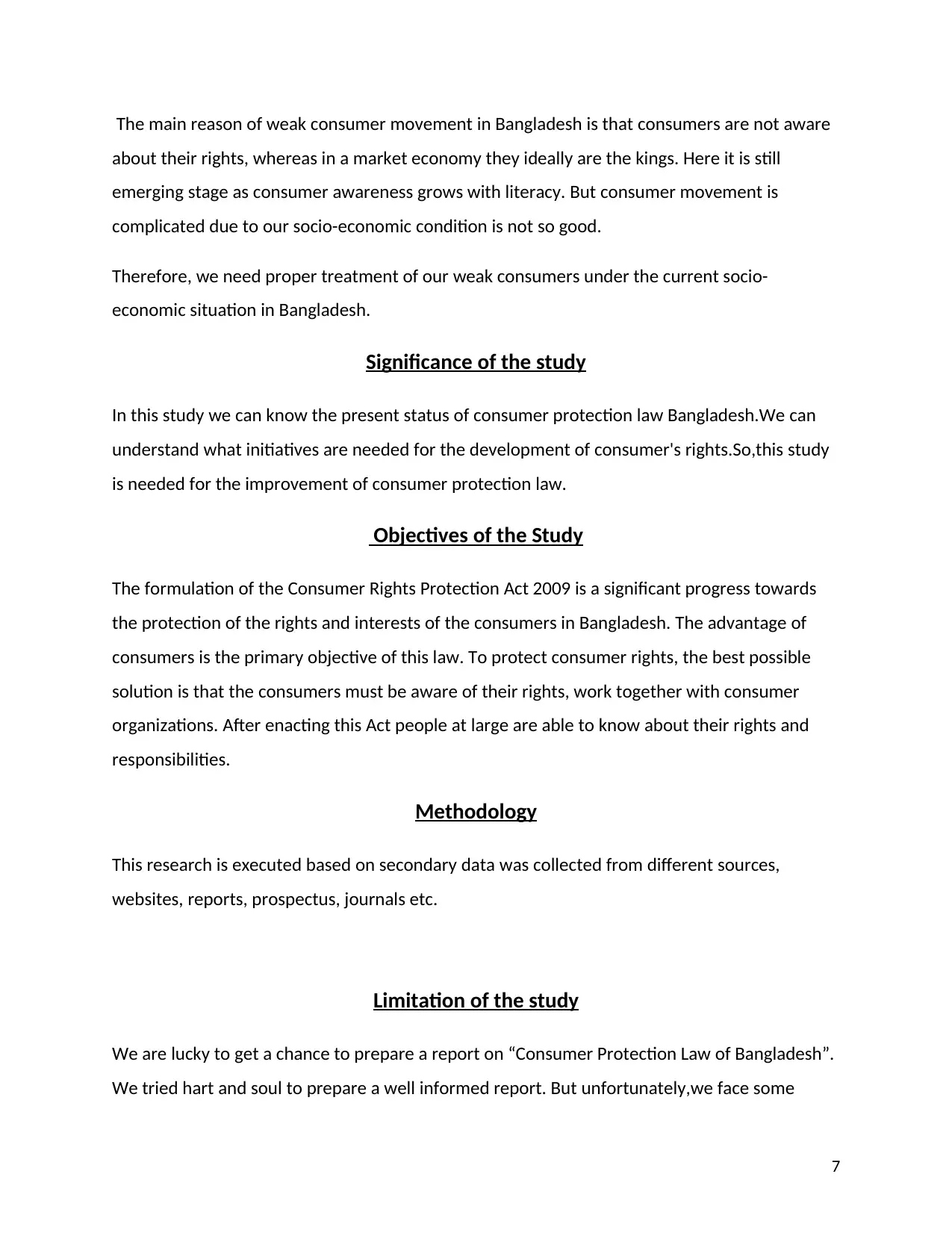
The main reason of weak consumer movement in Bangladesh is that consumers are not aware
about their rights, whereas in a market economy they ideally are the kings. Here it is still
emerging stage as consumer awareness grows with literacy. But consumer movement is
complicated due to our socio-economic condition is not so good.
Therefore, we need proper treatment of our weak consumers under the current socio-
economic situation in Bangladesh.
Significance of the study
In this study we can know the present status of consumer protection law Bangladesh.We can
understand what initiatives are needed for the development of consumer's rights.So,this study
is needed for the improvement of consumer protection law.
Objectives of the Study
The formulation of the Consumer Rights Protection Act 2009 is a significant progress towards
the protection of the rights and interests of the consumers in Bangladesh. The advantage of
consumers is the primary objective of this law. To protect consumer rights, the best possible
solution is that the consumers must be aware of their rights, work together with consumer
organizations. After enacting this Act people at large are able to know about their rights and
responsibilities.
Methodology
This research is executed based on secondary data was collected from different sources,
websites, reports, prospectus, journals etc.
Limitation of the study
We are lucky to get a chance to prepare a report on “Consumer Protection Law of Bangladesh”.
We tried hart and soul to prepare a well informed report. But unfortunately,we face some
7
about their rights, whereas in a market economy they ideally are the kings. Here it is still
emerging stage as consumer awareness grows with literacy. But consumer movement is
complicated due to our socio-economic condition is not so good.
Therefore, we need proper treatment of our weak consumers under the current socio-
economic situation in Bangladesh.
Significance of the study
In this study we can know the present status of consumer protection law Bangladesh.We can
understand what initiatives are needed for the development of consumer's rights.So,this study
is needed for the improvement of consumer protection law.
Objectives of the Study
The formulation of the Consumer Rights Protection Act 2009 is a significant progress towards
the protection of the rights and interests of the consumers in Bangladesh. The advantage of
consumers is the primary objective of this law. To protect consumer rights, the best possible
solution is that the consumers must be aware of their rights, work together with consumer
organizations. After enacting this Act people at large are able to know about their rights and
responsibilities.
Methodology
This research is executed based on secondary data was collected from different sources,
websites, reports, prospectus, journals etc.
Limitation of the study
We are lucky to get a chance to prepare a report on “Consumer Protection Law of Bangladesh”.
We tried hart and soul to prepare a well informed report. But unfortunately,we face some
7
Paraphrase This Document
Need a fresh take? Get an instant paraphrase of this document with our AI Paraphraser
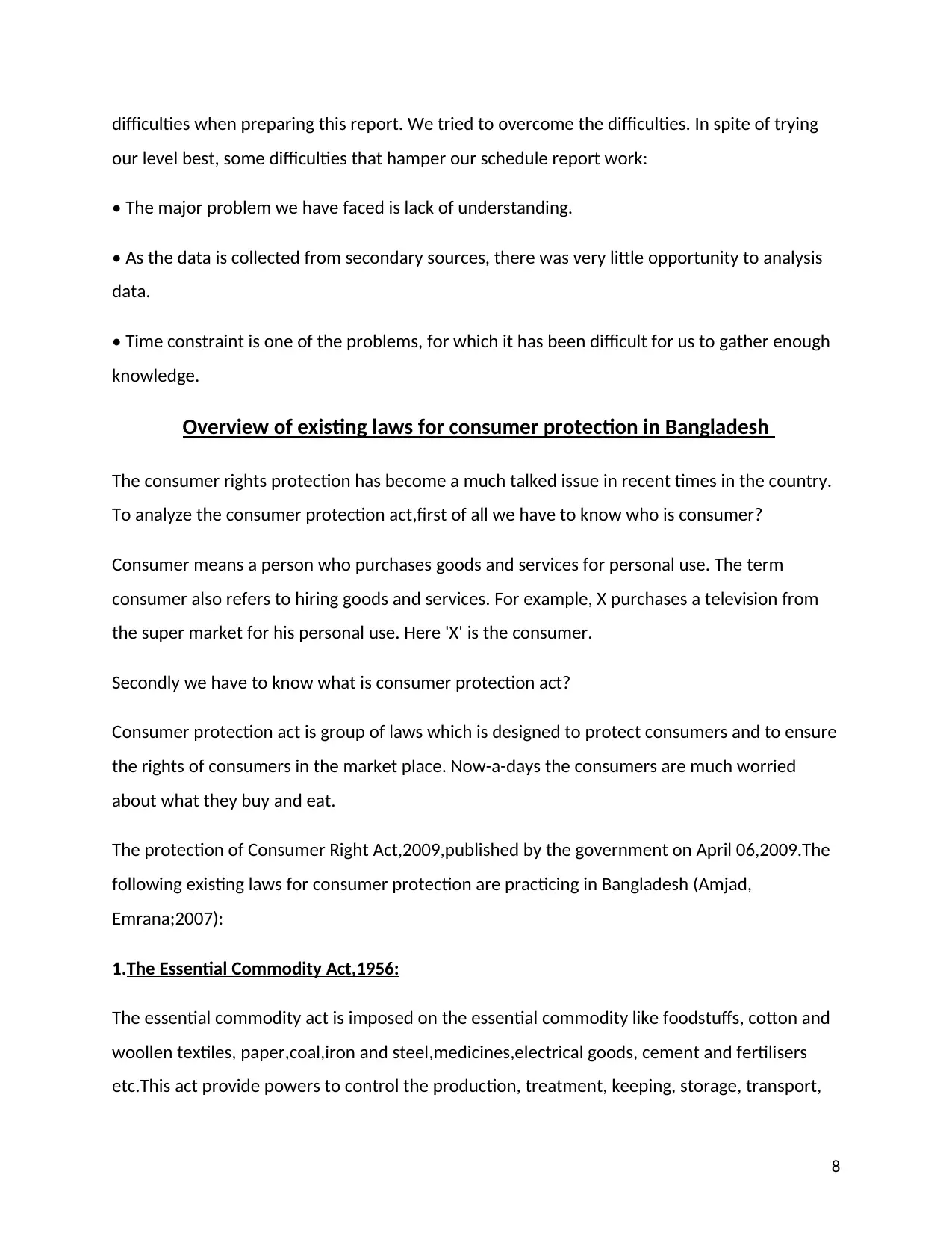
difficulties when preparing this report. We tried to overcome the difficulties. In spite of trying
our level best, some difficulties that hamper our schedule report work:
• The major problem we have faced is lack of understanding.
• As the data is collected from secondary sources, there was very little opportunity to analysis
data.
• Time constraint is one of the problems, for which it has been difficult for us to gather enough
knowledge.
Overview of existing laws for consumer protection in Bangladesh
The consumer rights protection has become a much talked issue in recent times in the country.
To analyze the consumer protection act,first of all we have to know who is consumer?
Consumer means a person who purchases goods and services for personal use. The term
consumer also refers to hiring goods and services. For example, X purchases a television from
the super market for his personal use. Here 'X' is the consumer.
Secondly we have to know what is consumer protection act?
Consumer protection act is group of laws which is designed to protect consumers and to ensure
the rights of consumers in the market place. Now-a-days the consumers are much worried
about what they buy and eat.
The protection of Consumer Right Act,2009,published by the government on April 06,2009.The
following existing laws for consumer protection are practicing in Bangladesh (Amjad,
Emrana;2007):
1.The Essential Commodity Act,1956:
The essential commodity act is imposed on the essential commodity like foodstuffs, cotton and
woollen textiles, paper,coal,iron and steel,medicines,electrical goods, cement and fertilisers
etc.This act provide powers to control the production, treatment, keeping, storage, transport,
8
our level best, some difficulties that hamper our schedule report work:
• The major problem we have faced is lack of understanding.
• As the data is collected from secondary sources, there was very little opportunity to analysis
data.
• Time constraint is one of the problems, for which it has been difficult for us to gather enough
knowledge.
Overview of existing laws for consumer protection in Bangladesh
The consumer rights protection has become a much talked issue in recent times in the country.
To analyze the consumer protection act,first of all we have to know who is consumer?
Consumer means a person who purchases goods and services for personal use. The term
consumer also refers to hiring goods and services. For example, X purchases a television from
the super market for his personal use. Here 'X' is the consumer.
Secondly we have to know what is consumer protection act?
Consumer protection act is group of laws which is designed to protect consumers and to ensure
the rights of consumers in the market place. Now-a-days the consumers are much worried
about what they buy and eat.
The protection of Consumer Right Act,2009,published by the government on April 06,2009.The
following existing laws for consumer protection are practicing in Bangladesh (Amjad,
Emrana;2007):
1.The Essential Commodity Act,1956:
The essential commodity act is imposed on the essential commodity like foodstuffs, cotton and
woollen textiles, paper,coal,iron and steel,medicines,electrical goods, cement and fertilisers
etc.This act provide powers to control the production, treatment, keeping, storage, transport,
8
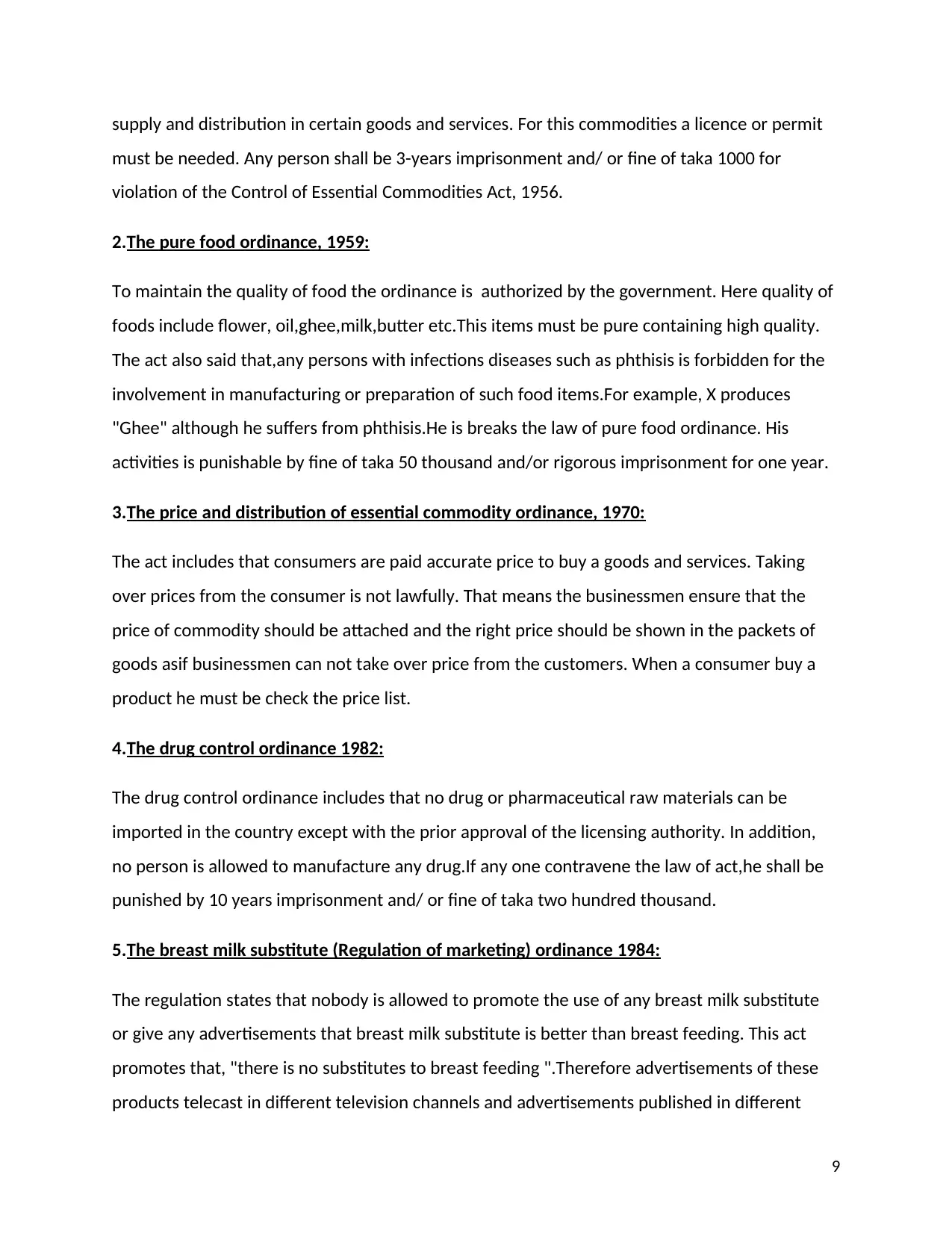
supply and distribution in certain goods and services. For this commodities a licence or permit
must be needed. Any person shall be 3-years imprisonment and/ or fine of taka 1000 for
violation of the Control of Essential Commodities Act, 1956.
2.The pure food ordinance, 1959:
To maintain the quality of food the ordinance is authorized by the government. Here quality of
foods include flower, oil,ghee,milk,butter etc.This items must be pure containing high quality.
The act also said that,any persons with infections diseases such as phthisis is forbidden for the
involvement in manufacturing or preparation of such food items.For example, X produces
"Ghee" although he suffers from phthisis.He is breaks the law of pure food ordinance. His
activities is punishable by fine of taka 50 thousand and/or rigorous imprisonment for one year.
3.The price and distribution of essential commodity ordinance, 1970:
The act includes that consumers are paid accurate price to buy a goods and services. Taking
over prices from the consumer is not lawfully. That means the businessmen ensure that the
price of commodity should be attached and the right price should be shown in the packets of
goods asif businessmen can not take over price from the customers. When a consumer buy a
product he must be check the price list.
4.The drug control ordinance 1982:
The drug control ordinance includes that no drug or pharmaceutical raw materials can be
imported in the country except with the prior approval of the licensing authority. In addition,
no person is allowed to manufacture any drug.If any one contravene the law of act,he shall be
punished by 10 years imprisonment and/ or fine of taka two hundred thousand.
5.The breast milk substitute (Regulation of marketing) ordinance 1984:
The regulation states that nobody is allowed to promote the use of any breast milk substitute
or give any advertisements that breast milk substitute is better than breast feeding. This act
promotes that, "there is no substitutes to breast feeding ".Therefore advertisements of these
products telecast in different television channels and advertisements published in different
9
must be needed. Any person shall be 3-years imprisonment and/ or fine of taka 1000 for
violation of the Control of Essential Commodities Act, 1956.
2.The pure food ordinance, 1959:
To maintain the quality of food the ordinance is authorized by the government. Here quality of
foods include flower, oil,ghee,milk,butter etc.This items must be pure containing high quality.
The act also said that,any persons with infections diseases such as phthisis is forbidden for the
involvement in manufacturing or preparation of such food items.For example, X produces
"Ghee" although he suffers from phthisis.He is breaks the law of pure food ordinance. His
activities is punishable by fine of taka 50 thousand and/or rigorous imprisonment for one year.
3.The price and distribution of essential commodity ordinance, 1970:
The act includes that consumers are paid accurate price to buy a goods and services. Taking
over prices from the consumer is not lawfully. That means the businessmen ensure that the
price of commodity should be attached and the right price should be shown in the packets of
goods asif businessmen can not take over price from the customers. When a consumer buy a
product he must be check the price list.
4.The drug control ordinance 1982:
The drug control ordinance includes that no drug or pharmaceutical raw materials can be
imported in the country except with the prior approval of the licensing authority. In addition,
no person is allowed to manufacture any drug.If any one contravene the law of act,he shall be
punished by 10 years imprisonment and/ or fine of taka two hundred thousand.
5.The breast milk substitute (Regulation of marketing) ordinance 1984:
The regulation states that nobody is allowed to promote the use of any breast milk substitute
or give any advertisements that breast milk substitute is better than breast feeding. This act
promotes that, "there is no substitutes to breast feeding ".Therefore advertisements of these
products telecast in different television channels and advertisements published in different
9
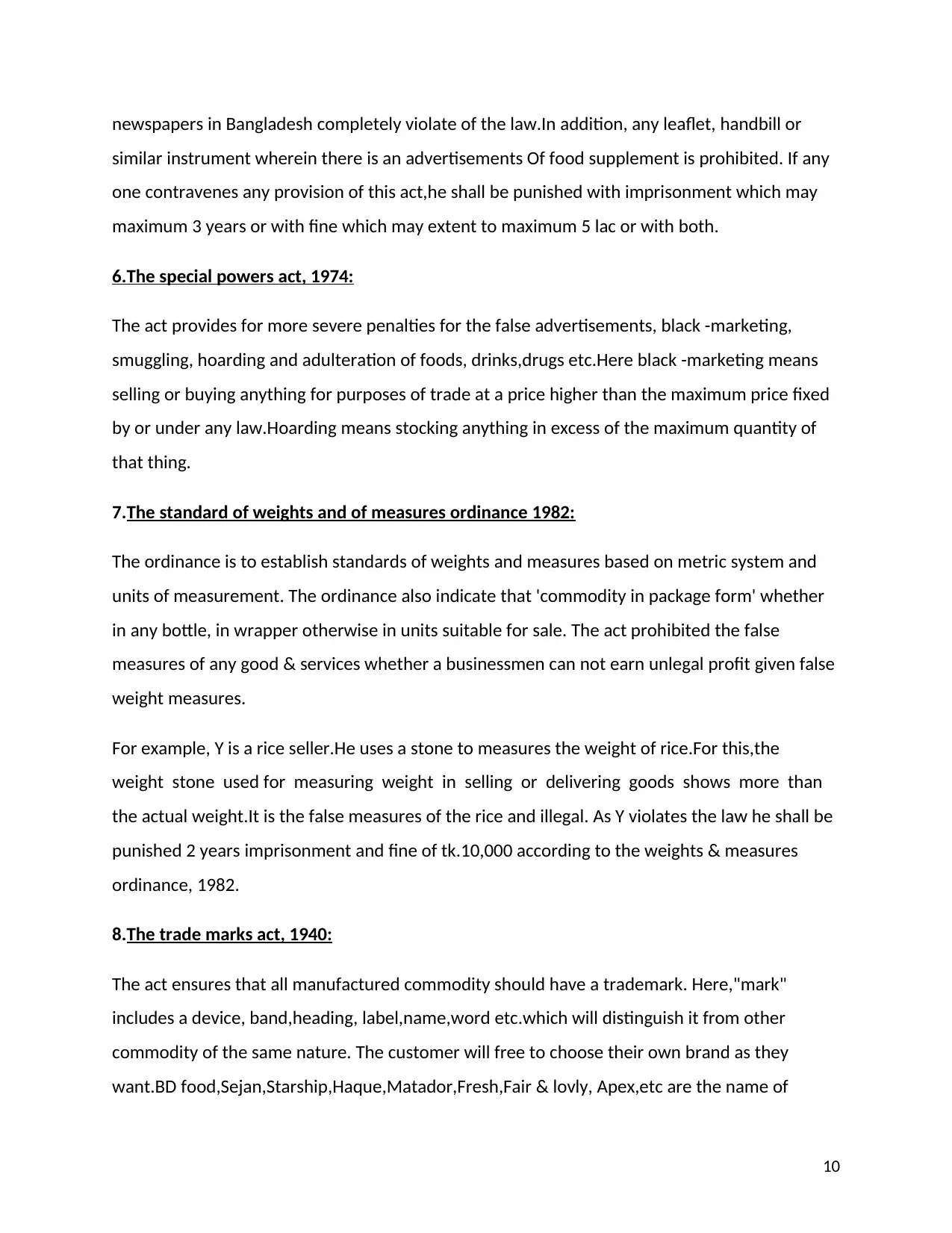
newspapers in Bangladesh completely violate of the law.In addition, any leaflet, handbill or
similar instrument wherein there is an advertisements Of food supplement is prohibited. If any
one contravenes any provision of this act,he shall be punished with imprisonment which may
maximum 3 years or with fine which may extent to maximum 5 lac or with both.
6.The special powers act, 1974:
The act provides for more severe penalties for the false advertisements, black -marketing,
smuggling, hoarding and adulteration of foods, drinks,drugs etc.Here black -marketing means
selling or buying anything for purposes of trade at a price higher than the maximum price fixed
by or under any law.Hoarding means stocking anything in excess of the maximum quantity of
that thing.
7.The standard of weights and of measures ordinance 1982:
The ordinance is to establish standards of weights and measures based on metric system and
units of measurement. The ordinance also indicate that 'commodity in package form' whether
in any bottle, in wrapper otherwise in units suitable for sale. The act prohibited the false
measures of any good & services whether a businessmen can not earn unlegal profit given false
weight measures.
For example, Y is a rice seller.He uses a stone to measures the weight of rice.For this,the
weight stone used for measuring weight in selling or delivering goods shows more than
the actual weight.It is the false measures of the rice and illegal. As Y violates the law he shall be
punished 2 years imprisonment and fine of tk.10,000 according to the weights & measures
ordinance, 1982.
8.The trade marks act, 1940:
The act ensures that all manufactured commodity should have a trademark. Here,"mark"
includes a device, band,heading, label,name,word etc.which will distinguish it from other
commodity of the same nature. The customer will free to choose their own brand as they
want.BD food,Sejan,Starship,Haque,Matador,Fresh,Fair & lovly, Apex,etc are the name of
10
similar instrument wherein there is an advertisements Of food supplement is prohibited. If any
one contravenes any provision of this act,he shall be punished with imprisonment which may
maximum 3 years or with fine which may extent to maximum 5 lac or with both.
6.The special powers act, 1974:
The act provides for more severe penalties for the false advertisements, black -marketing,
smuggling, hoarding and adulteration of foods, drinks,drugs etc.Here black -marketing means
selling or buying anything for purposes of trade at a price higher than the maximum price fixed
by or under any law.Hoarding means stocking anything in excess of the maximum quantity of
that thing.
7.The standard of weights and of measures ordinance 1982:
The ordinance is to establish standards of weights and measures based on metric system and
units of measurement. The ordinance also indicate that 'commodity in package form' whether
in any bottle, in wrapper otherwise in units suitable for sale. The act prohibited the false
measures of any good & services whether a businessmen can not earn unlegal profit given false
weight measures.
For example, Y is a rice seller.He uses a stone to measures the weight of rice.For this,the
weight stone used for measuring weight in selling or delivering goods shows more than
the actual weight.It is the false measures of the rice and illegal. As Y violates the law he shall be
punished 2 years imprisonment and fine of tk.10,000 according to the weights & measures
ordinance, 1982.
8.The trade marks act, 1940:
The act ensures that all manufactured commodity should have a trademark. Here,"mark"
includes a device, band,heading, label,name,word etc.which will distinguish it from other
commodity of the same nature. The customer will free to choose their own brand as they
want.BD food,Sejan,Starship,Haque,Matador,Fresh,Fair & lovly, Apex,etc are the name of
10
Secure Best Marks with AI Grader
Need help grading? Try our AI Grader for instant feedback on your assignments.
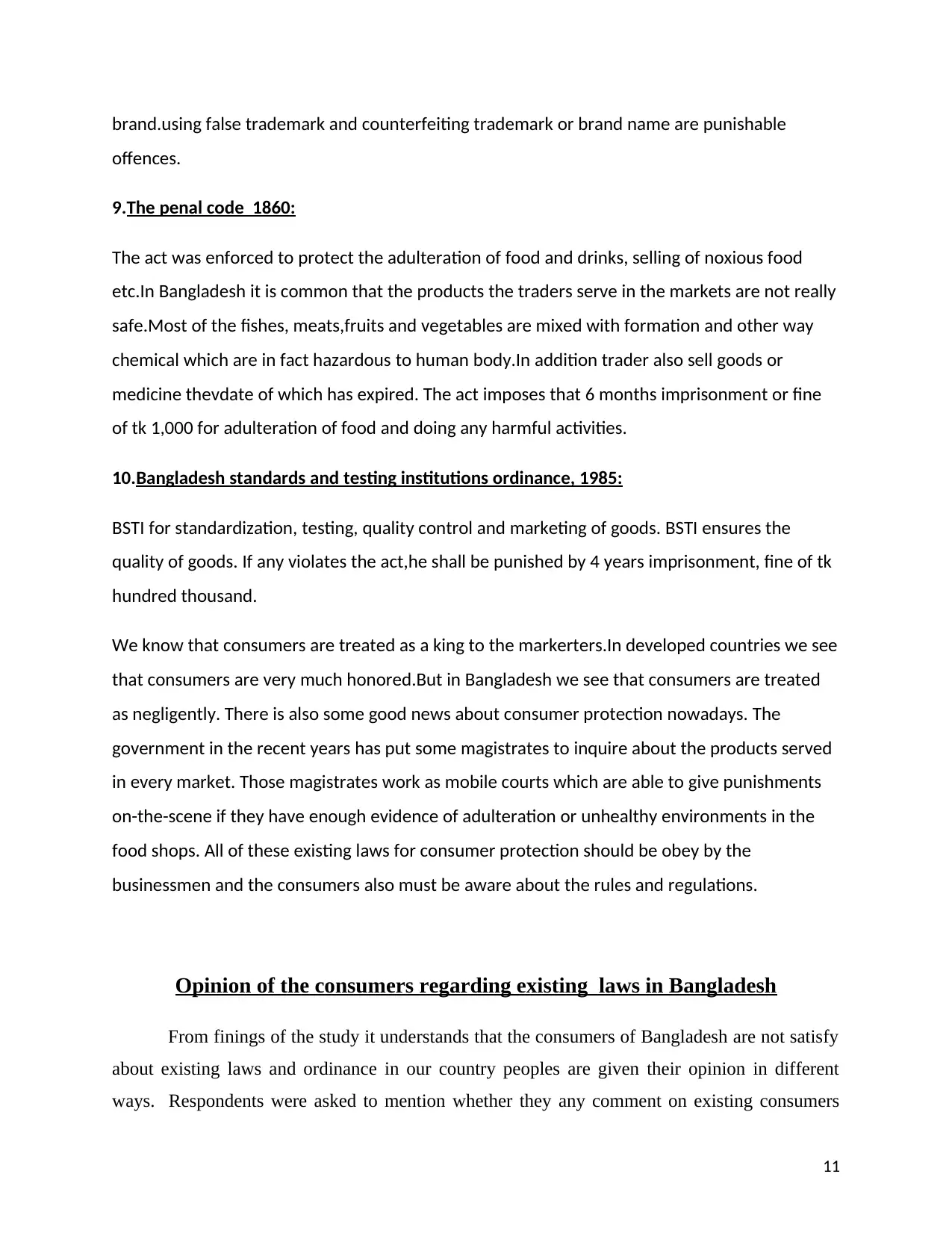
brand.using false trademark and counterfeiting trademark or brand name are punishable
offences.
9.The penal code 1860:
The act was enforced to protect the adulteration of food and drinks, selling of noxious food
etc.In Bangladesh it is common that the products the traders serve in the markets are not really
safe.Most of the fishes, meats,fruits and vegetables are mixed with formation and other way
chemical which are in fact hazardous to human body.In addition trader also sell goods or
medicine thevdate of which has expired. The act imposes that 6 months imprisonment or fine
of tk 1,000 for adulteration of food and doing any harmful activities.
10.Bangladesh standards and testing institutions ordinance, 1985:
BSTI for standardization, testing, quality control and marketing of goods. BSTI ensures the
quality of goods. If any violates the act,he shall be punished by 4 years imprisonment, fine of tk
hundred thousand.
We know that consumers are treated as a king to the markerters.In developed countries we see
that consumers are very much honored.But in Bangladesh we see that consumers are treated
as negligently. There is also some good news about consumer protection nowadays. The
government in the recent years has put some magistrates to inquire about the products served
in every market. Those magistrates work as mobile courts which are able to give punishments
on-the-scene if they have enough evidence of adulteration or unhealthy environments in the
food shops. All of these existing laws for consumer protection should be obey by the
businessmen and the consumers also must be aware about the rules and regulations.
Opinion of the consumers regarding existing laws in Bangladesh
From finings of the study it understands that the consumers of Bangladesh are not satisfy
about existing laws and ordinance in our country peoples are given their opinion in different
ways. Respondents were asked to mention whether they any comment on existing consumers
11
offences.
9.The penal code 1860:
The act was enforced to protect the adulteration of food and drinks, selling of noxious food
etc.In Bangladesh it is common that the products the traders serve in the markets are not really
safe.Most of the fishes, meats,fruits and vegetables are mixed with formation and other way
chemical which are in fact hazardous to human body.In addition trader also sell goods or
medicine thevdate of which has expired. The act imposes that 6 months imprisonment or fine
of tk 1,000 for adulteration of food and doing any harmful activities.
10.Bangladesh standards and testing institutions ordinance, 1985:
BSTI for standardization, testing, quality control and marketing of goods. BSTI ensures the
quality of goods. If any violates the act,he shall be punished by 4 years imprisonment, fine of tk
hundred thousand.
We know that consumers are treated as a king to the markerters.In developed countries we see
that consumers are very much honored.But in Bangladesh we see that consumers are treated
as negligently. There is also some good news about consumer protection nowadays. The
government in the recent years has put some magistrates to inquire about the products served
in every market. Those magistrates work as mobile courts which are able to give punishments
on-the-scene if they have enough evidence of adulteration or unhealthy environments in the
food shops. All of these existing laws for consumer protection should be obey by the
businessmen and the consumers also must be aware about the rules and regulations.
Opinion of the consumers regarding existing laws in Bangladesh
From finings of the study it understands that the consumers of Bangladesh are not satisfy
about existing laws and ordinance in our country peoples are given their opinion in different
ways. Respondents were asked to mention whether they any comment on existing consumers
11
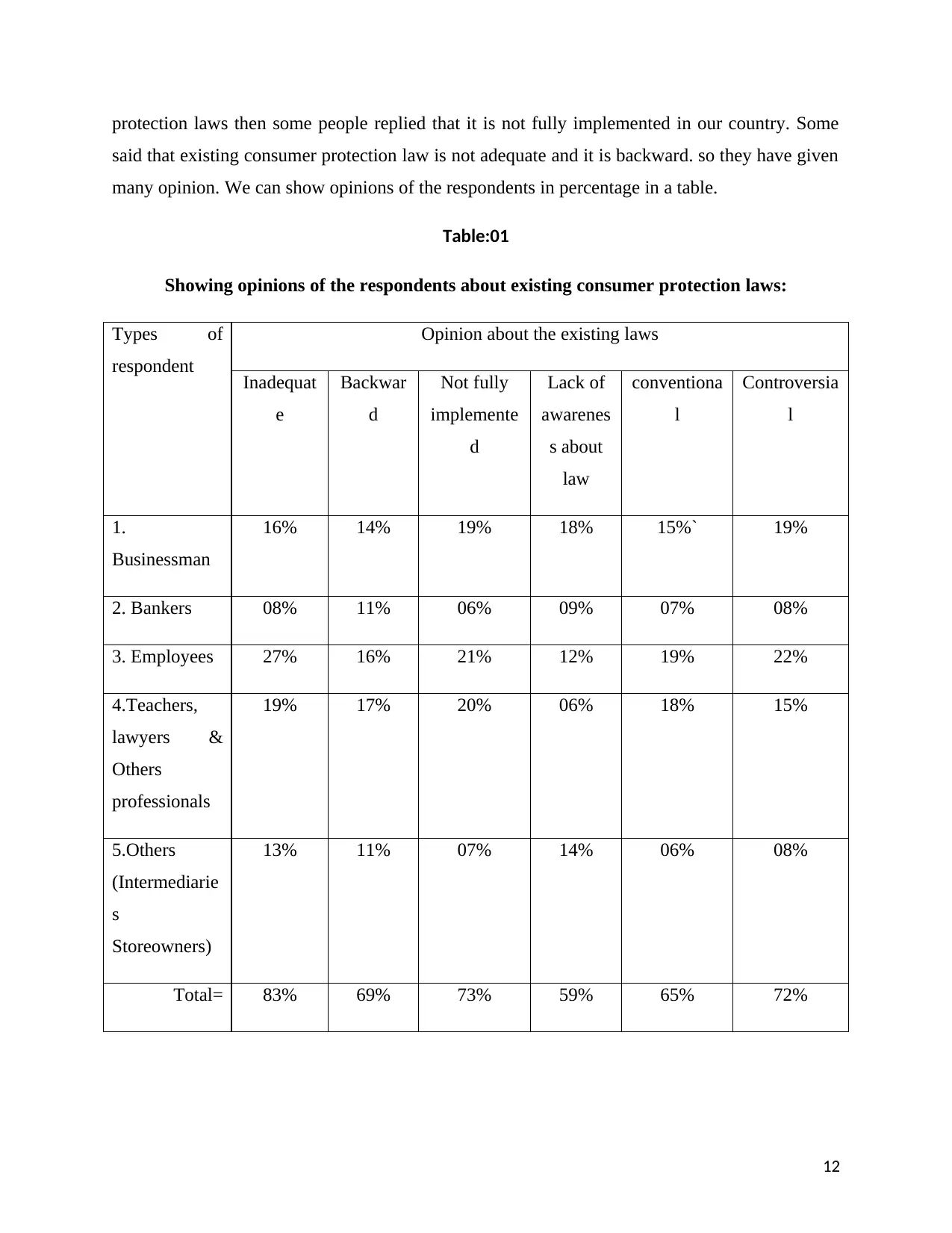
protection laws then some people replied that it is not fully implemented in our country. Some
said that existing consumer protection law is not adequate and it is backward. so they have given
many opinion. We can show opinions of the respondents in percentage in a table.
Table:01
Showing opinions of the respondents about existing consumer protection laws:
Types of
respondent
Opinion about the existing laws
Inadequat
e
Backwar
d
Not fully
implemente
d
Lack of
awarenes
s about
law
conventiona
l
Controversia
l
1.
Businessman
16% 14% 19% 18% 15%` 19%
2. Bankers 08% 11% 06% 09% 07% 08%
3. Employees 27% 16% 21% 12% 19% 22%
4.Teachers,
lawyers &
Others
professionals
19% 17% 20% 06% 18% 15%
5.Others
(Intermediarie
s
Storeowners)
13% 11% 07% 14% 06% 08%
Total= 83% 69% 73% 59% 65% 72%
12
said that existing consumer protection law is not adequate and it is backward. so they have given
many opinion. We can show opinions of the respondents in percentage in a table.
Table:01
Showing opinions of the respondents about existing consumer protection laws:
Types of
respondent
Opinion about the existing laws
Inadequat
e
Backwar
d
Not fully
implemente
d
Lack of
awarenes
s about
law
conventiona
l
Controversia
l
1.
Businessman
16% 14% 19% 18% 15%` 19%
2. Bankers 08% 11% 06% 09% 07% 08%
3. Employees 27% 16% 21% 12% 19% 22%
4.Teachers,
lawyers &
Others
professionals
19% 17% 20% 06% 18% 15%
5.Others
(Intermediarie
s
Storeowners)
13% 11% 07% 14% 06% 08%
Total= 83% 69% 73% 59% 65% 72%
12
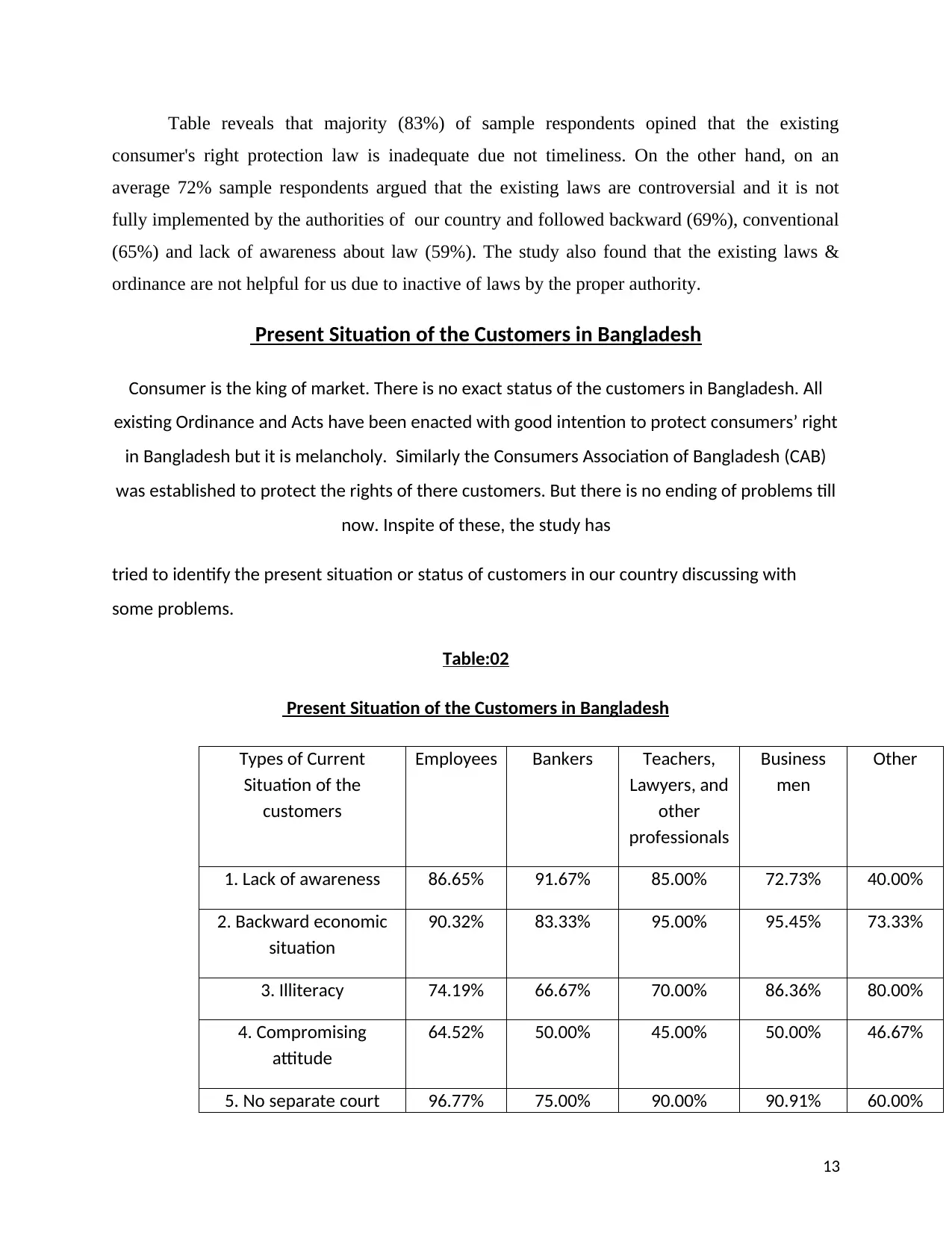
Table reveals that majority (83%) of sample respondents opined that the existing
consumer's right protection law is inadequate due not timeliness. On the other hand, on an
average 72% sample respondents argued that the existing laws are controversial and it is not
fully implemented by the authorities of our country and followed backward (69%), conventional
(65%) and lack of awareness about law (59%). The study also found that the existing laws &
ordinance are not helpful for us due to inactive of laws by the proper authority.
Present Situation of the Customers in Bangladesh
Consumer is the king of market. There is no exact status of the customers in Bangladesh. All
existing Ordinance and Acts have been enacted with good intention to protect consumers’ right
in Bangladesh but it is melancholy. Similarly the Consumers Association of Bangladesh (CAB)
was established to protect the rights of there customers. But there is no ending of problems till
now. Inspite of these, the study has
tried to identify the present situation or status of customers in our country discussing with
some problems.
Table:02
Present Situation of the Customers in Bangladesh
Types of Current
Situation of the
customers
Employees Bankers Teachers,
Lawyers, and
other
professionals
Business
men
Other
1. Lack of awareness 86.65% 91.67% 85.00% 72.73% 40.00%
2. Backward economic
situation
90.32% 83.33% 95.00% 95.45% 73.33%
3. Illiteracy 74.19% 66.67% 70.00% 86.36% 80.00%
4. Compromising
attitude
64.52% 50.00% 45.00% 50.00% 46.67%
5. No separate court 96.77% 75.00% 90.00% 90.91% 60.00%
13
consumer's right protection law is inadequate due not timeliness. On the other hand, on an
average 72% sample respondents argued that the existing laws are controversial and it is not
fully implemented by the authorities of our country and followed backward (69%), conventional
(65%) and lack of awareness about law (59%). The study also found that the existing laws &
ordinance are not helpful for us due to inactive of laws by the proper authority.
Present Situation of the Customers in Bangladesh
Consumer is the king of market. There is no exact status of the customers in Bangladesh. All
existing Ordinance and Acts have been enacted with good intention to protect consumers’ right
in Bangladesh but it is melancholy. Similarly the Consumers Association of Bangladesh (CAB)
was established to protect the rights of there customers. But there is no ending of problems till
now. Inspite of these, the study has
tried to identify the present situation or status of customers in our country discussing with
some problems.
Table:02
Present Situation of the Customers in Bangladesh
Types of Current
Situation of the
customers
Employees Bankers Teachers,
Lawyers, and
other
professionals
Business
men
Other
1. Lack of awareness 86.65% 91.67% 85.00% 72.73% 40.00%
2. Backward economic
situation
90.32% 83.33% 95.00% 95.45% 73.33%
3. Illiteracy 74.19% 66.67% 70.00% 86.36% 80.00%
4. Compromising
attitude
64.52% 50.00% 45.00% 50.00% 46.67%
5. No separate court 96.77% 75.00% 90.00% 90.91% 60.00%
13
Paraphrase This Document
Need a fresh take? Get an instant paraphrase of this document with our AI Paraphraser
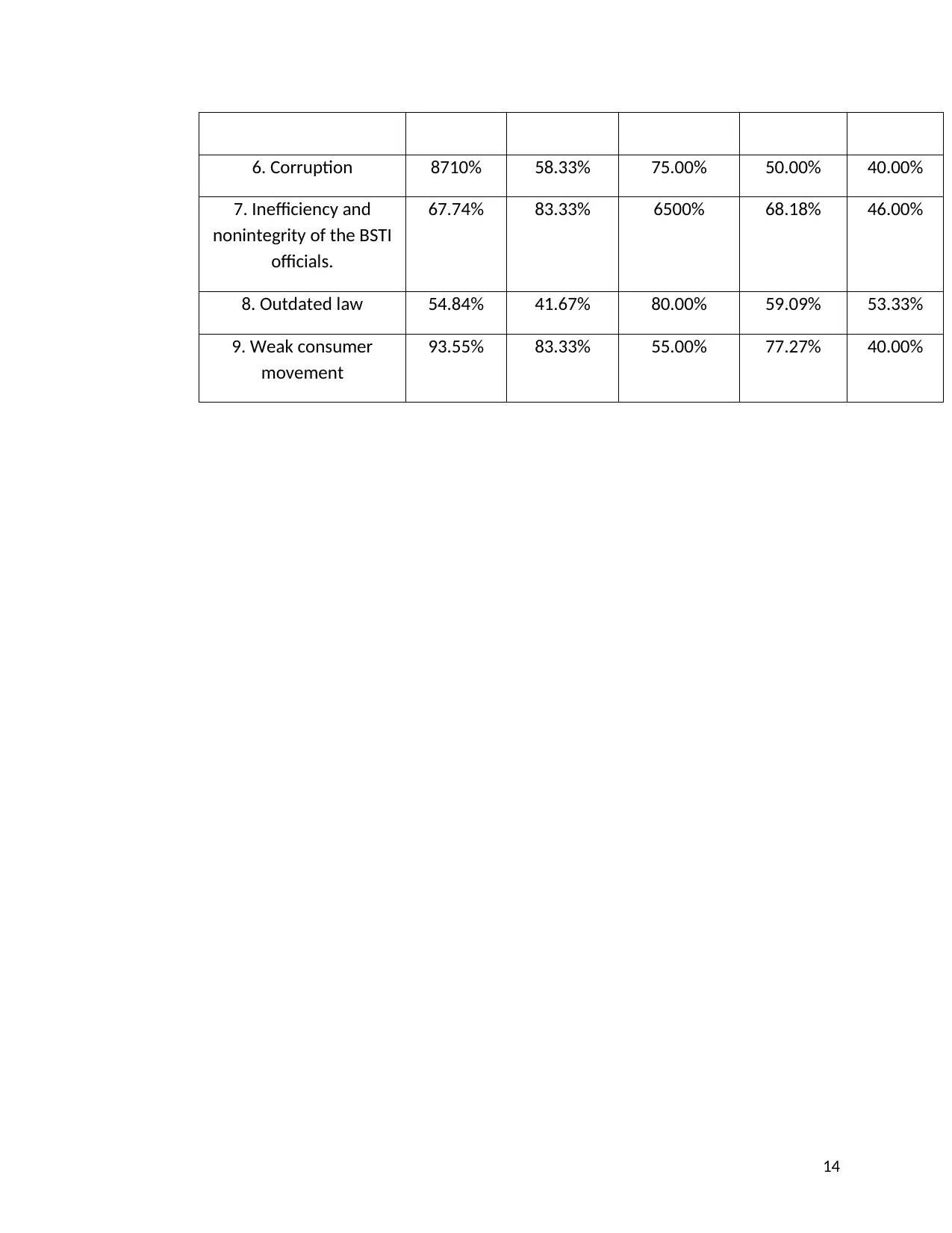
6. Corruption 8710% 58.33% 75.00% 50.00% 40.00%
7. Inefficiency and
nonintegrity of the BSTI
officials.
67.74% 83.33% 6500% 68.18% 46.00%
8. Outdated law 54.84% 41.67% 80.00% 59.09% 53.33%
9. Weak consumer
movement
93.55% 83.33% 55.00% 77.27% 40.00%
14
7. Inefficiency and
nonintegrity of the BSTI
officials.
67.74% 83.33% 6500% 68.18% 46.00%
8. Outdated law 54.84% 41.67% 80.00% 59.09% 53.33%
9. Weak consumer
movement
93.55% 83.33% 55.00% 77.27% 40.00%
14
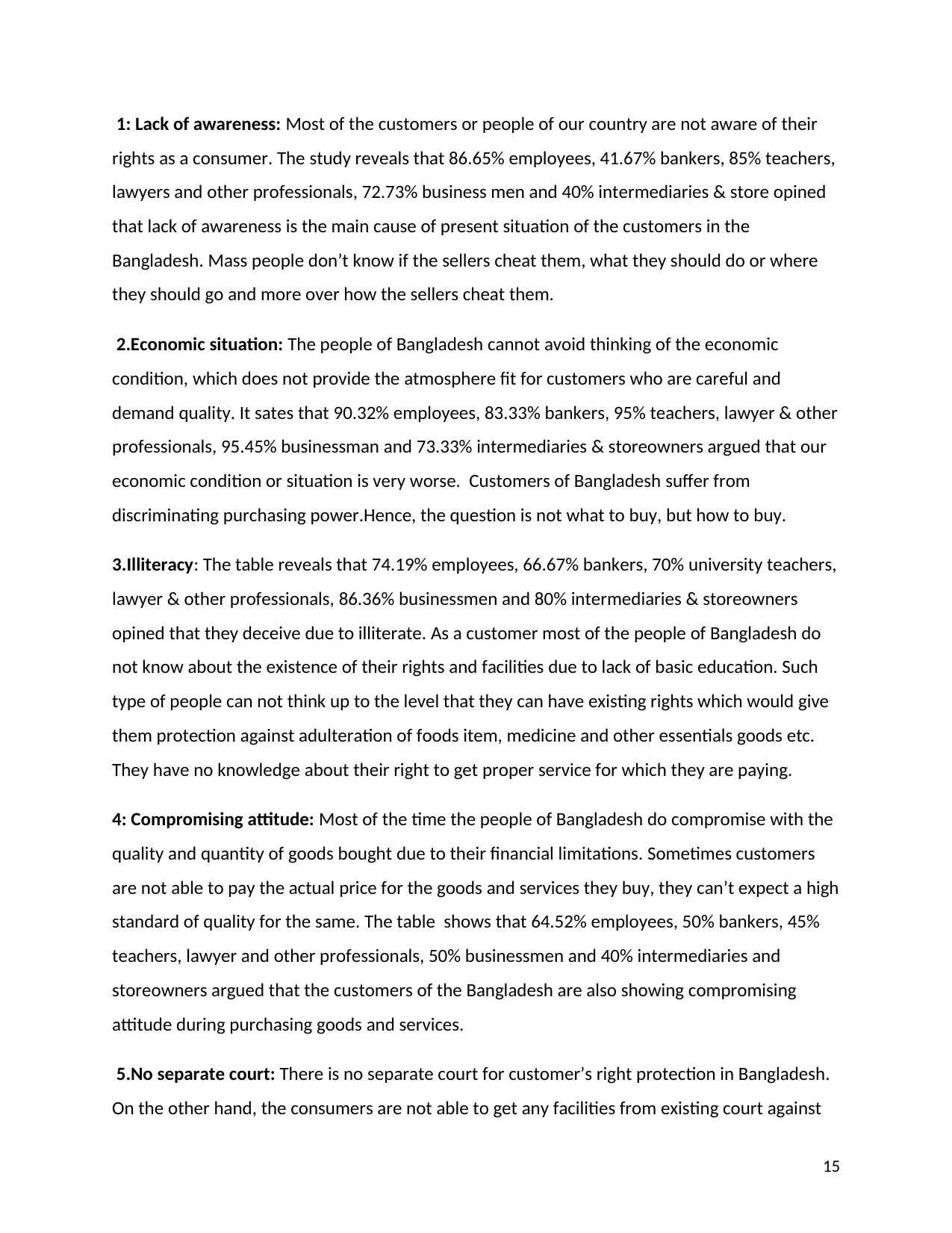
1: Lack of awareness: Most of the customers or people of our country are not aware of their
rights as a consumer. The study reveals that 86.65% employees, 41.67% bankers, 85% teachers,
lawyers and other professionals, 72.73% business men and 40% intermediaries & store opined
that lack of awareness is the main cause of present situation of the customers in the
Bangladesh. Mass people don’t know if the sellers cheat them, what they should do or where
they should go and more over how the sellers cheat them.
2.Economic situation: The people of Bangladesh cannot avoid thinking of the economic
condition, which does not provide the atmosphere fit for customers who are careful and
demand quality. It sates that 90.32% employees, 83.33% bankers, 95% teachers, lawyer & other
professionals, 95.45% businessman and 73.33% intermediaries & storeowners argued that our
economic condition or situation is very worse. Customers of Bangladesh suffer from
discriminating purchasing power.Hence, the question is not what to buy, but how to buy.
3.Illiteracy: The table reveals that 74.19% employees, 66.67% bankers, 70% university teachers,
lawyer & other professionals, 86.36% businessmen and 80% intermediaries & storeowners
opined that they deceive due to illiterate. As a customer most of the people of Bangladesh do
not know about the existence of their rights and facilities due to lack of basic education. Such
type of people can not think up to the level that they can have existing rights which would give
them protection against adulteration of foods item, medicine and other essentials goods etc.
They have no knowledge about their right to get proper service for which they are paying.
4: Compromising attitude: Most of the time the people of Bangladesh do compromise with the
quality and quantity of goods bought due to their financial limitations. Sometimes customers
are not able to pay the actual price for the goods and services they buy, they can’t expect a high
standard of quality for the same. The table shows that 64.52% employees, 50% bankers, 45%
teachers, lawyer and other professionals, 50% businessmen and 40% intermediaries and
storeowners argued that the customers of the Bangladesh are also showing compromising
attitude during purchasing goods and services.
5.No separate court: There is no separate court for customer’s right protection in Bangladesh.
On the other hand, the consumers are not able to get any facilities from existing court against
15
rights as a consumer. The study reveals that 86.65% employees, 41.67% bankers, 85% teachers,
lawyers and other professionals, 72.73% business men and 40% intermediaries & store opined
that lack of awareness is the main cause of present situation of the customers in the
Bangladesh. Mass people don’t know if the sellers cheat them, what they should do or where
they should go and more over how the sellers cheat them.
2.Economic situation: The people of Bangladesh cannot avoid thinking of the economic
condition, which does not provide the atmosphere fit for customers who are careful and
demand quality. It sates that 90.32% employees, 83.33% bankers, 95% teachers, lawyer & other
professionals, 95.45% businessman and 73.33% intermediaries & storeowners argued that our
economic condition or situation is very worse. Customers of Bangladesh suffer from
discriminating purchasing power.Hence, the question is not what to buy, but how to buy.
3.Illiteracy: The table reveals that 74.19% employees, 66.67% bankers, 70% university teachers,
lawyer & other professionals, 86.36% businessmen and 80% intermediaries & storeowners
opined that they deceive due to illiterate. As a customer most of the people of Bangladesh do
not know about the existence of their rights and facilities due to lack of basic education. Such
type of people can not think up to the level that they can have existing rights which would give
them protection against adulteration of foods item, medicine and other essentials goods etc.
They have no knowledge about their right to get proper service for which they are paying.
4: Compromising attitude: Most of the time the people of Bangladesh do compromise with the
quality and quantity of goods bought due to their financial limitations. Sometimes customers
are not able to pay the actual price for the goods and services they buy, they can’t expect a high
standard of quality for the same. The table shows that 64.52% employees, 50% bankers, 45%
teachers, lawyer and other professionals, 50% businessmen and 40% intermediaries and
storeowners argued that the customers of the Bangladesh are also showing compromising
attitude during purchasing goods and services.
5.No separate court: There is no separate court for customer’s right protection in Bangladesh.
On the other hand, the consumers are not able to get any facilities from existing court against
15
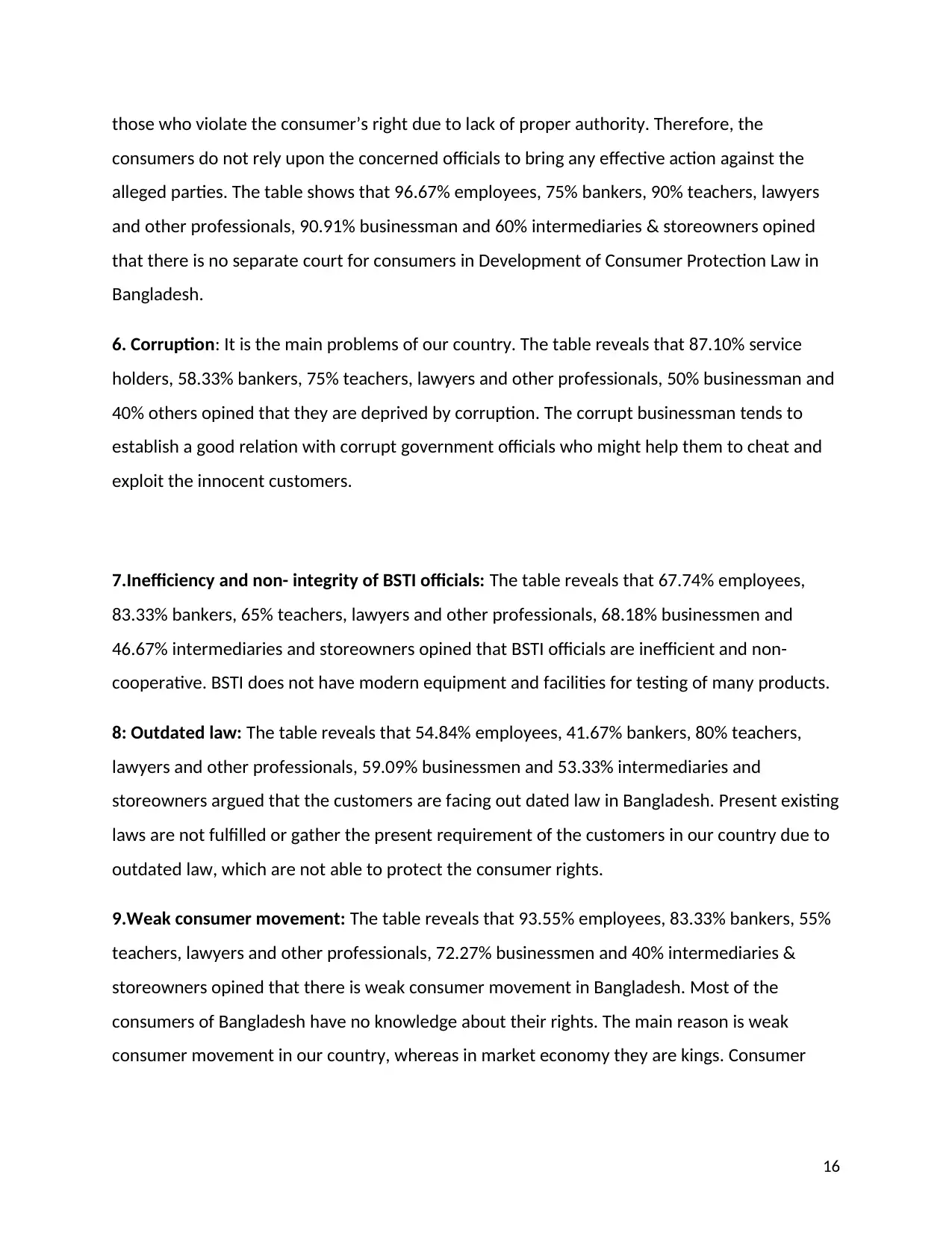
those who violate the consumer’s right due to lack of proper authority. Therefore, the
consumers do not rely upon the concerned officials to bring any effective action against the
alleged parties. The table shows that 96.67% employees, 75% bankers, 90% teachers, lawyers
and other professionals, 90.91% businessman and 60% intermediaries & storeowners opined
that there is no separate court for consumers in Development of Consumer Protection Law in
Bangladesh.
6. Corruption: It is the main problems of our country. The table reveals that 87.10% service
holders, 58.33% bankers, 75% teachers, lawyers and other professionals, 50% businessman and
40% others opined that they are deprived by corruption. The corrupt businessman tends to
establish a good relation with corrupt government officials who might help them to cheat and
exploit the innocent customers.
7.Inefficiency and non- integrity of BSTI officials: The table reveals that 67.74% employees,
83.33% bankers, 65% teachers, lawyers and other professionals, 68.18% businessmen and
46.67% intermediaries and storeowners opined that BSTI officials are inefficient and non-
cooperative. BSTI does not have modern equipment and facilities for testing of many products.
8: Outdated law: The table reveals that 54.84% employees, 41.67% bankers, 80% teachers,
lawyers and other professionals, 59.09% businessmen and 53.33% intermediaries and
storeowners argued that the customers are facing out dated law in Bangladesh. Present existing
laws are not fulfilled or gather the present requirement of the customers in our country due to
outdated law, which are not able to protect the consumer rights.
9.Weak consumer movement: The table reveals that 93.55% employees, 83.33% bankers, 55%
teachers, lawyers and other professionals, 72.27% businessmen and 40% intermediaries &
storeowners opined that there is weak consumer movement in Bangladesh. Most of the
consumers of Bangladesh have no knowledge about their rights. The main reason is weak
consumer movement in our country, whereas in market economy they are kings. Consumer
16
consumers do not rely upon the concerned officials to bring any effective action against the
alleged parties. The table shows that 96.67% employees, 75% bankers, 90% teachers, lawyers
and other professionals, 90.91% businessman and 60% intermediaries & storeowners opined
that there is no separate court for consumers in Development of Consumer Protection Law in
Bangladesh.
6. Corruption: It is the main problems of our country. The table reveals that 87.10% service
holders, 58.33% bankers, 75% teachers, lawyers and other professionals, 50% businessman and
40% others opined that they are deprived by corruption. The corrupt businessman tends to
establish a good relation with corrupt government officials who might help them to cheat and
exploit the innocent customers.
7.Inefficiency and non- integrity of BSTI officials: The table reveals that 67.74% employees,
83.33% bankers, 65% teachers, lawyers and other professionals, 68.18% businessmen and
46.67% intermediaries and storeowners opined that BSTI officials are inefficient and non-
cooperative. BSTI does not have modern equipment and facilities for testing of many products.
8: Outdated law: The table reveals that 54.84% employees, 41.67% bankers, 80% teachers,
lawyers and other professionals, 59.09% businessmen and 53.33% intermediaries and
storeowners argued that the customers are facing out dated law in Bangladesh. Present existing
laws are not fulfilled or gather the present requirement of the customers in our country due to
outdated law, which are not able to protect the consumer rights.
9.Weak consumer movement: The table reveals that 93.55% employees, 83.33% bankers, 55%
teachers, lawyers and other professionals, 72.27% businessmen and 40% intermediaries &
storeowners opined that there is weak consumer movement in Bangladesh. Most of the
consumers of Bangladesh have no knowledge about their rights. The main reason is weak
consumer movement in our country, whereas in market economy they are kings. Consumer
16
Secure Best Marks with AI Grader
Need help grading? Try our AI Grader for instant feedback on your assignments.
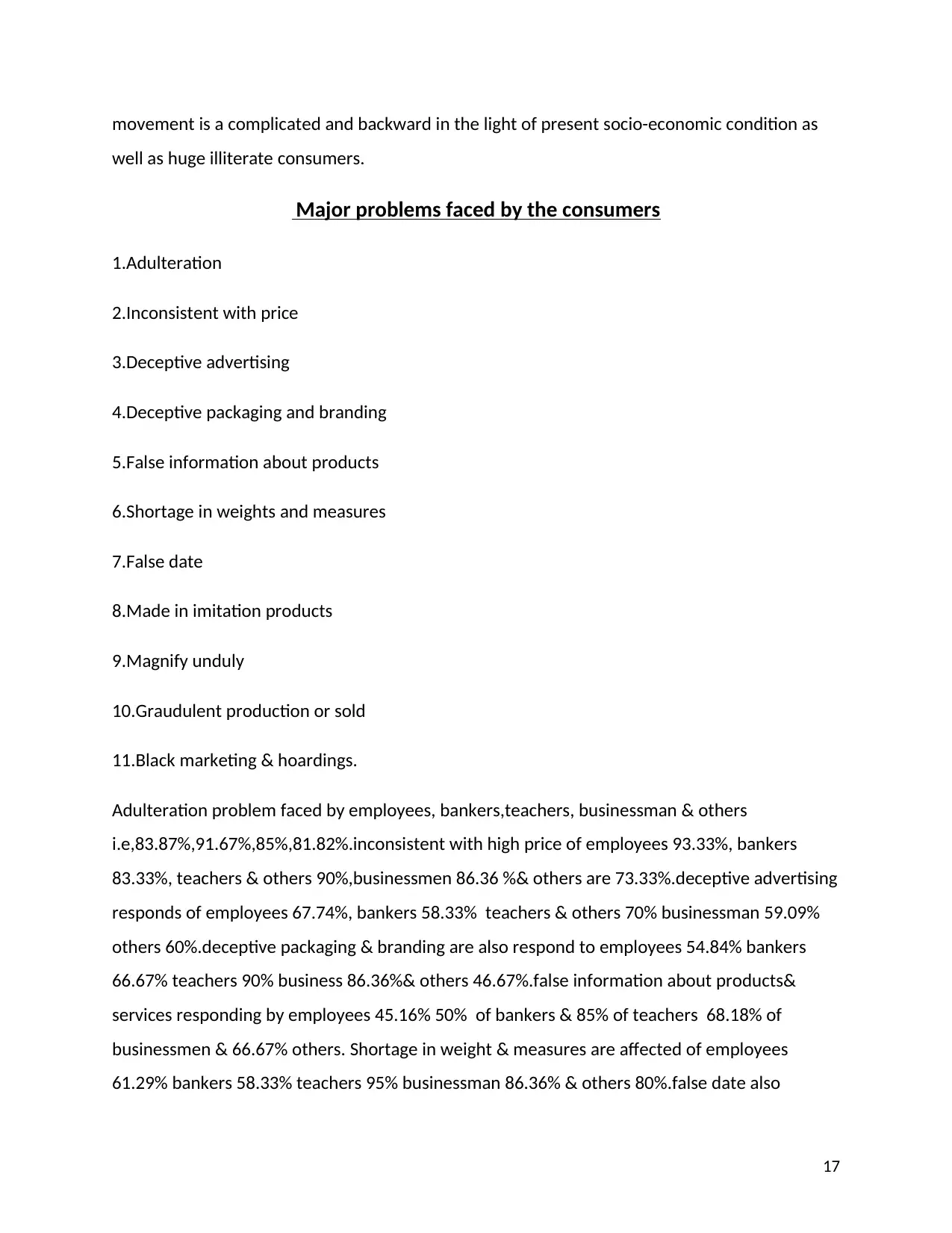
movement is a complicated and backward in the light of present socio-economic condition as
well as huge illiterate consumers.
Major problems faced by the consumers
1.Adulteration
2.Inconsistent with price
3.Deceptive advertising
4.Deceptive packaging and branding
5.False information about products
6.Shortage in weights and measures
7.False date
8.Made in imitation products
9.Magnify unduly
10.Graudulent production or sold
11.Black marketing & hoardings.
Adulteration problem faced by employees, bankers,teachers, businessman & others
i.e,83.87%,91.67%,85%,81.82%.inconsistent with high price of employees 93.33%, bankers
83.33%, teachers & others 90%,businessmen 86.36 %& others are 73.33%.deceptive advertising
responds of employees 67.74%, bankers 58.33% teachers & others 70% businessman 59.09%
others 60%.deceptive packaging & branding are also respond to employees 54.84% bankers
66.67% teachers 90% business 86.36%& others 46.67%.false information about products&
services responding by employees 45.16% 50% of bankers & 85% of teachers 68.18% of
businessmen & 66.67% others. Shortage in weight & measures are affected of employees
61.29% bankers 58.33% teachers 95% businessman 86.36% & others 80%.false date also
17
well as huge illiterate consumers.
Major problems faced by the consumers
1.Adulteration
2.Inconsistent with price
3.Deceptive advertising
4.Deceptive packaging and branding
5.False information about products
6.Shortage in weights and measures
7.False date
8.Made in imitation products
9.Magnify unduly
10.Graudulent production or sold
11.Black marketing & hoardings.
Adulteration problem faced by employees, bankers,teachers, businessman & others
i.e,83.87%,91.67%,85%,81.82%.inconsistent with high price of employees 93.33%, bankers
83.33%, teachers & others 90%,businessmen 86.36 %& others are 73.33%.deceptive advertising
responds of employees 67.74%, bankers 58.33% teachers & others 70% businessman 59.09%
others 60%.deceptive packaging & branding are also respond to employees 54.84% bankers
66.67% teachers 90% business 86.36%& others 46.67%.false information about products&
services responding by employees 45.16% 50% of bankers & 85% of teachers 68.18% of
businessmen & 66.67% others. Shortage in weight & measures are affected of employees
61.29% bankers 58.33% teachers 95% businessman 86.36% & others 80%.false date also
17
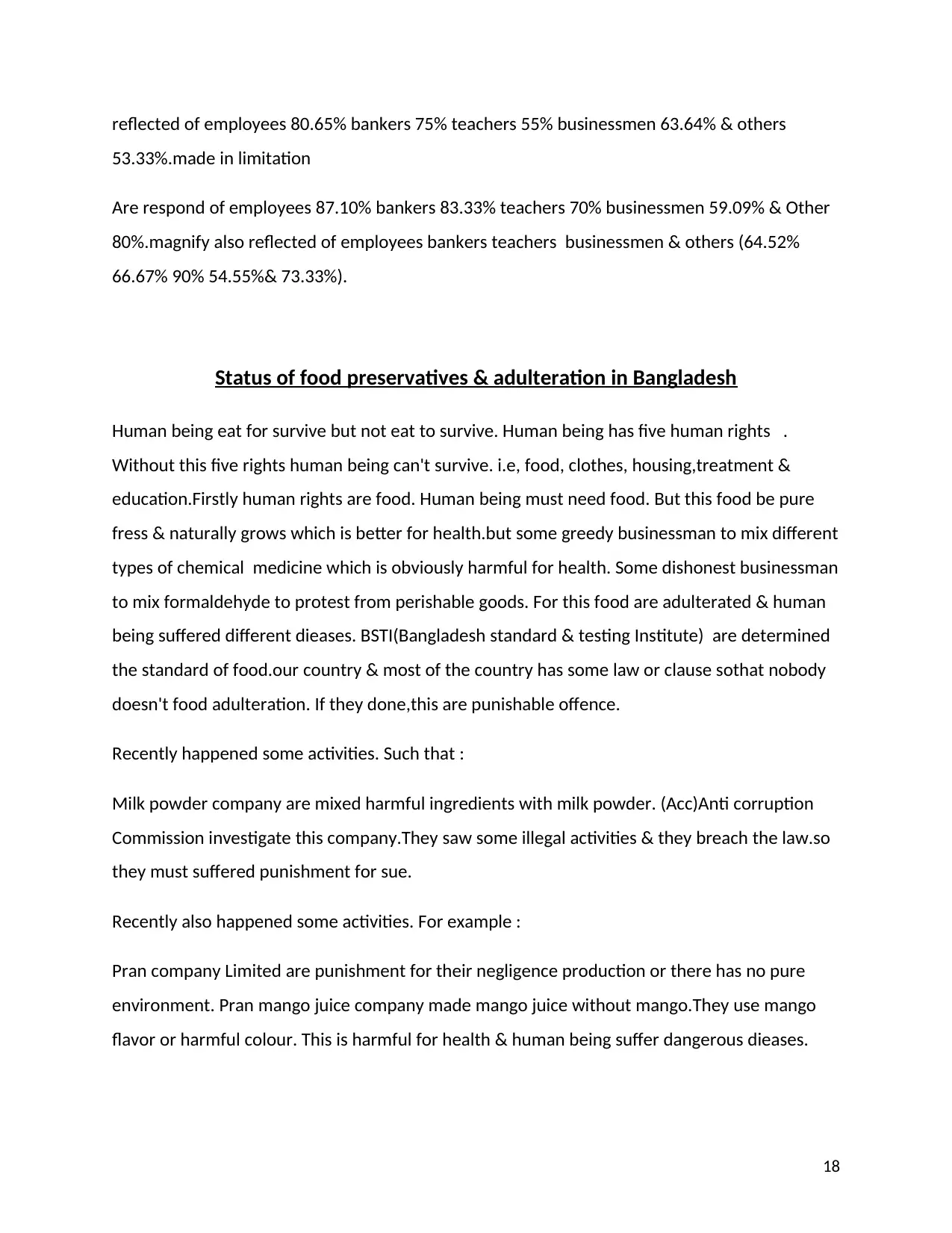
reflected of employees 80.65% bankers 75% teachers 55% businessmen 63.64% & others
53.33%.made in limitation
Are respond of employees 87.10% bankers 83.33% teachers 70% businessmen 59.09% & Other
80%.magnify also reflected of employees bankers teachers businessmen & others (64.52%
66.67% 90% 54.55%& 73.33%).
Status of food preservatives & adulteration in Bangladesh
Human being eat for survive but not eat to survive. Human being has five human rights .
Without this five rights human being can't survive. i.e, food, clothes, housing,treatment &
education.Firstly human rights are food. Human being must need food. But this food be pure
fress & naturally grows which is better for health.but some greedy businessman to mix different
types of chemical medicine which is obviously harmful for health. Some dishonest businessman
to mix formaldehyde to protest from perishable goods. For this food are adulterated & human
being suffered different dieases. BSTI(Bangladesh standard & testing Institute) are determined
the standard of food.our country & most of the country has some law or clause sothat nobody
doesn't food adulteration. If they done,this are punishable offence.
Recently happened some activities. Such that :
Milk powder company are mixed harmful ingredients with milk powder. (Acc)Anti corruption
Commission investigate this company.They saw some illegal activities & they breach the law.so
they must suffered punishment for sue.
Recently also happened some activities. For example :
Pran company Limited are punishment for their negligence production or there has no pure
environment. Pran mango juice company made mango juice without mango.They use mango
flavor or harmful colour. This is harmful for health & human being suffer dangerous dieases.
18
53.33%.made in limitation
Are respond of employees 87.10% bankers 83.33% teachers 70% businessmen 59.09% & Other
80%.magnify also reflected of employees bankers teachers businessmen & others (64.52%
66.67% 90% 54.55%& 73.33%).
Status of food preservatives & adulteration in Bangladesh
Human being eat for survive but not eat to survive. Human being has five human rights .
Without this five rights human being can't survive. i.e, food, clothes, housing,treatment &
education.Firstly human rights are food. Human being must need food. But this food be pure
fress & naturally grows which is better for health.but some greedy businessman to mix different
types of chemical medicine which is obviously harmful for health. Some dishonest businessman
to mix formaldehyde to protest from perishable goods. For this food are adulterated & human
being suffered different dieases. BSTI(Bangladesh standard & testing Institute) are determined
the standard of food.our country & most of the country has some law or clause sothat nobody
doesn't food adulteration. If they done,this are punishable offence.
Recently happened some activities. Such that :
Milk powder company are mixed harmful ingredients with milk powder. (Acc)Anti corruption
Commission investigate this company.They saw some illegal activities & they breach the law.so
they must suffered punishment for sue.
Recently also happened some activities. For example :
Pran company Limited are punishment for their negligence production or there has no pure
environment. Pran mango juice company made mango juice without mango.They use mango
flavor or harmful colour. This is harmful for health & human being suffer dangerous dieases.
18
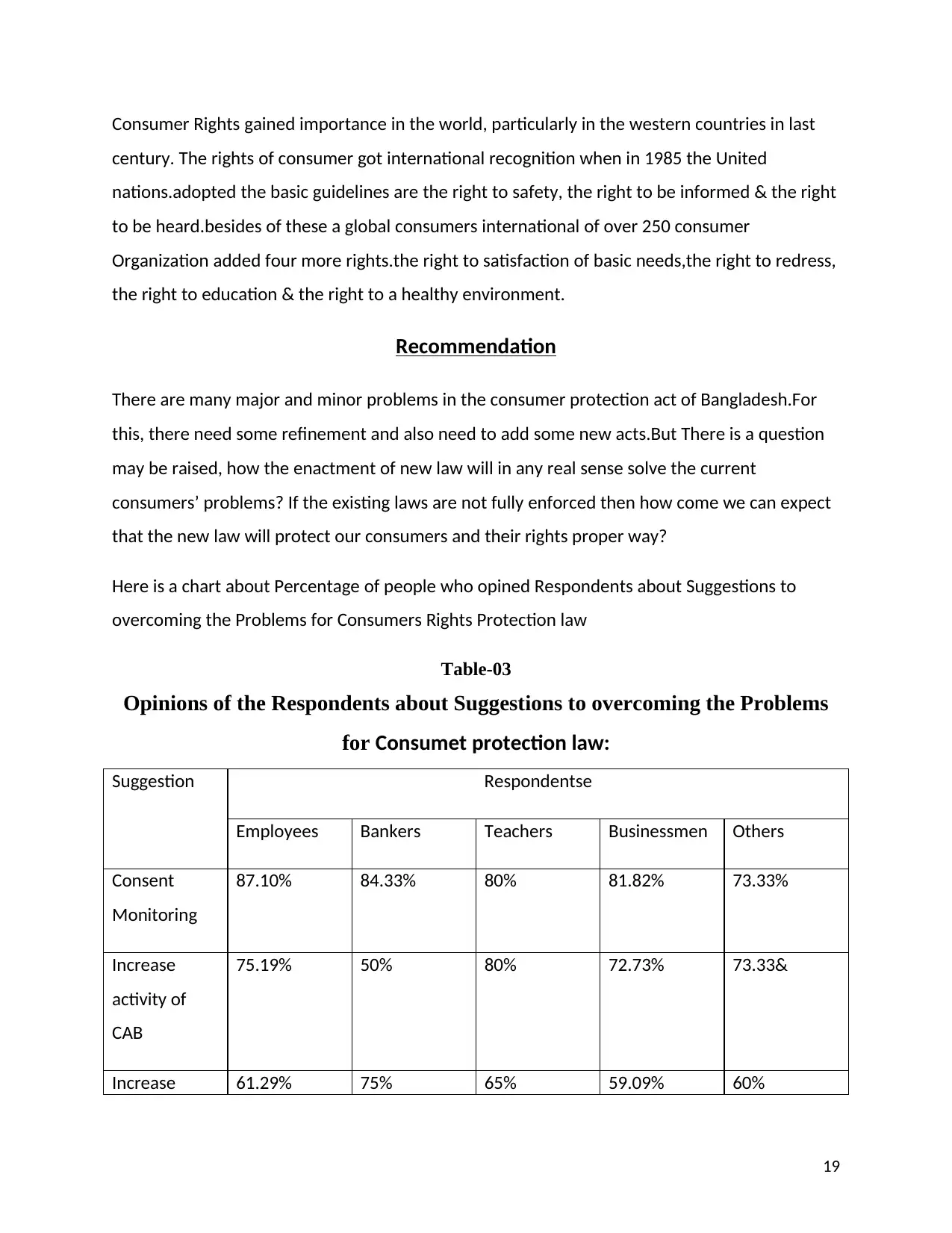
Consumer Rights gained importance in the world, particularly in the western countries in last
century. The rights of consumer got international recognition when in 1985 the United
nations.adopted the basic guidelines are the right to safety, the right to be informed & the right
to be heard.besides of these a global consumers international of over 250 consumer
Organization added four more rights.the right to satisfaction of basic needs,the right to redress,
the right to education & the right to a healthy environment.
Recommendation
There are many major and minor problems in the consumer protection act of Bangladesh.For
this, there need some refinement and also need to add some new acts.But There is a question
may be raised, how the enactment of new law will in any real sense solve the current
consumers’ problems? If the existing laws are not fully enforced then how come we can expect
that the new law will protect our consumers and their rights proper way?
Here is a chart about Percentage of people who opined Respondents about Suggestions to
overcoming the Problems for Consumers Rights Protection law
Table-03
Opinions of the Respondents about Suggestions to overcoming the Problems
for Consumet protection law:
Suggestion Respondentse
Employees Bankers Teachers Businessmen Others
Consent
Monitoring
87.10% 84.33% 80% 81.82% 73.33%
Increase
activity of
CAB
75.19% 50% 80% 72.73% 73.33&
Increase 61.29% 75% 65% 59.09% 60%
19
century. The rights of consumer got international recognition when in 1985 the United
nations.adopted the basic guidelines are the right to safety, the right to be informed & the right
to be heard.besides of these a global consumers international of over 250 consumer
Organization added four more rights.the right to satisfaction of basic needs,the right to redress,
the right to education & the right to a healthy environment.
Recommendation
There are many major and minor problems in the consumer protection act of Bangladesh.For
this, there need some refinement and also need to add some new acts.But There is a question
may be raised, how the enactment of new law will in any real sense solve the current
consumers’ problems? If the existing laws are not fully enforced then how come we can expect
that the new law will protect our consumers and their rights proper way?
Here is a chart about Percentage of people who opined Respondents about Suggestions to
overcoming the Problems for Consumers Rights Protection law
Table-03
Opinions of the Respondents about Suggestions to overcoming the Problems
for Consumet protection law:
Suggestion Respondentse
Employees Bankers Teachers Businessmen Others
Consent
Monitoring
87.10% 84.33% 80% 81.82% 73.33%
Increase
activity of
CAB
75.19% 50% 80% 72.73% 73.33&
Increase 61.29% 75% 65% 59.09% 60%
19
Paraphrase This Document
Need a fresh take? Get an instant paraphrase of this document with our AI Paraphraser
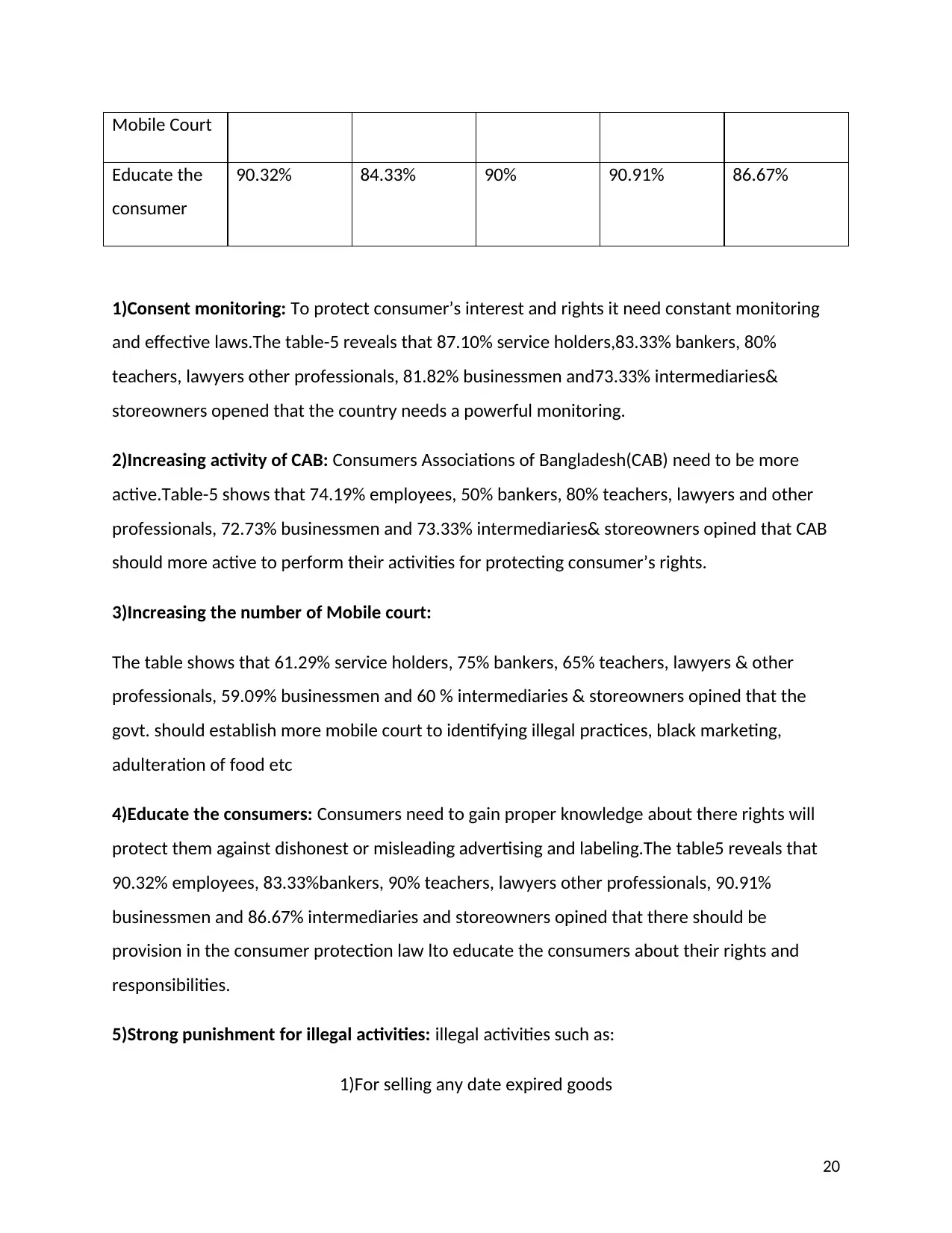
Mobile Court
Educate the
consumer
90.32% 84.33% 90% 90.91% 86.67%
1)Consent monitoring: To protect consumer’s interest and rights it need constant monitoring
and effective laws.The table-5 reveals that 87.10% service holders,83.33% bankers, 80%
teachers, lawyers other professionals, 81.82% businessmen and73.33% intermediaries&
storeowners opened that the country needs a powerful monitoring.
2)Increasing activity of CAB: Consumers Associations of Bangladesh(CAB) need to be more
active.Table-5 shows that 74.19% employees, 50% bankers, 80% teachers, lawyers and other
professionals, 72.73% businessmen and 73.33% intermediaries& storeowners opined that CAB
should more active to perform their activities for protecting consumer’s rights.
3)Increasing the number of Mobile court:
The table shows that 61.29% service holders, 75% bankers, 65% teachers, lawyers & other
professionals, 59.09% businessmen and 60 % intermediaries & storeowners opined that the
govt. should establish more mobile court to identifying illegal practices, black marketing,
adulteration of food etc
4)Educate the consumers: Consumers need to gain proper knowledge about there rights will
protect them against dishonest or misleading advertising and labeling.The table5 reveals that
90.32% employees, 83.33%bankers, 90% teachers, lawyers other professionals, 90.91%
businessmen and 86.67% intermediaries and storeowners opined that there should be
provision in the consumer protection law lto educate the consumers about their rights and
responsibilities.
5)Strong punishment for illegal activities: illegal activities such as:
1)For selling any date expired goods
20
Educate the
consumer
90.32% 84.33% 90% 90.91% 86.67%
1)Consent monitoring: To protect consumer’s interest and rights it need constant monitoring
and effective laws.The table-5 reveals that 87.10% service holders,83.33% bankers, 80%
teachers, lawyers other professionals, 81.82% businessmen and73.33% intermediaries&
storeowners opened that the country needs a powerful monitoring.
2)Increasing activity of CAB: Consumers Associations of Bangladesh(CAB) need to be more
active.Table-5 shows that 74.19% employees, 50% bankers, 80% teachers, lawyers and other
professionals, 72.73% businessmen and 73.33% intermediaries& storeowners opined that CAB
should more active to perform their activities for protecting consumer’s rights.
3)Increasing the number of Mobile court:
The table shows that 61.29% service holders, 75% bankers, 65% teachers, lawyers & other
professionals, 59.09% businessmen and 60 % intermediaries & storeowners opined that the
govt. should establish more mobile court to identifying illegal practices, black marketing,
adulteration of food etc
4)Educate the consumers: Consumers need to gain proper knowledge about there rights will
protect them against dishonest or misleading advertising and labeling.The table5 reveals that
90.32% employees, 83.33%bankers, 90% teachers, lawyers other professionals, 90.91%
businessmen and 86.67% intermediaries and storeowners opined that there should be
provision in the consumer protection law lto educate the consumers about their rights and
responsibilities.
5)Strong punishment for illegal activities: illegal activities such as:
1)For selling any date expired goods
20
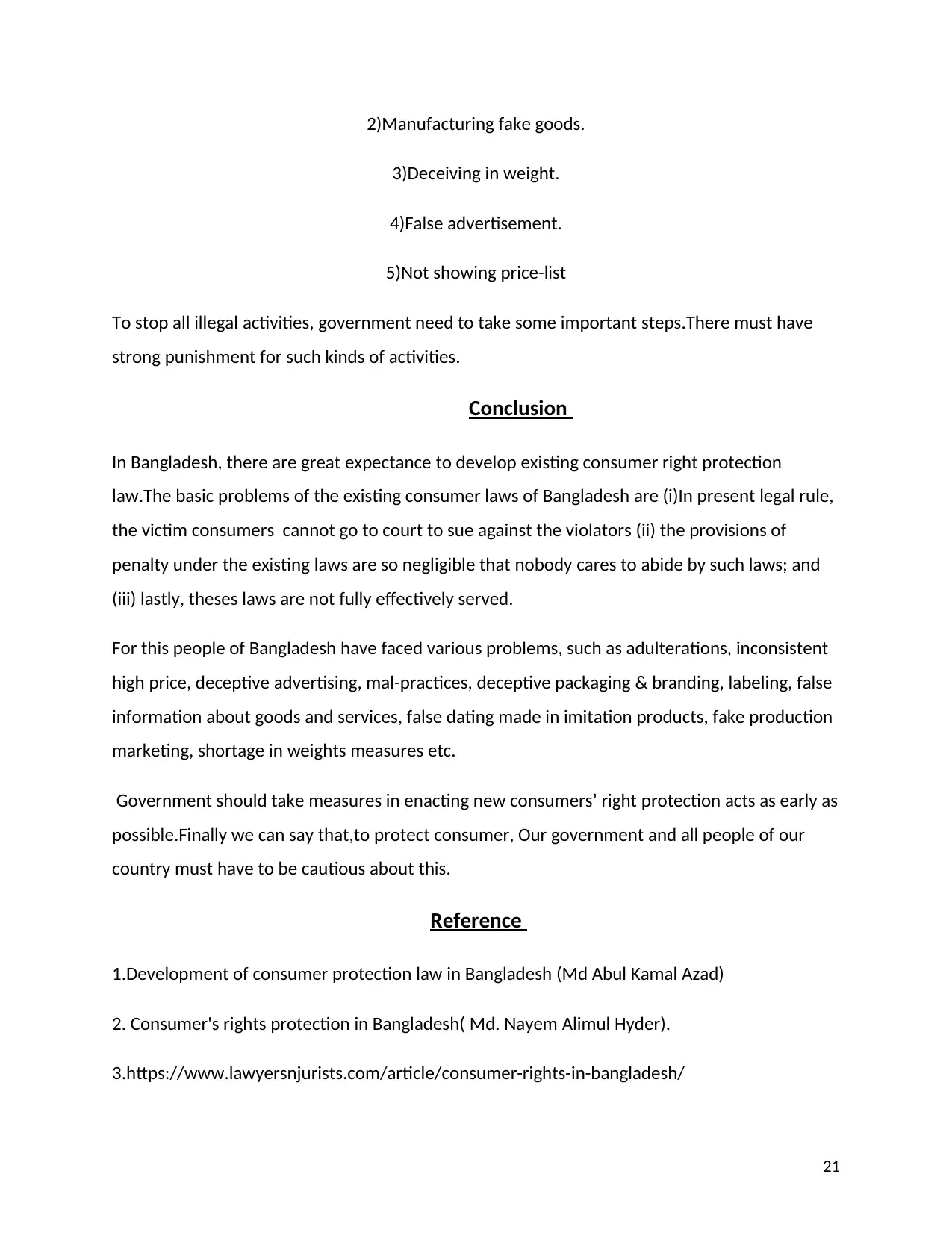
2)Manufacturing fake goods.
3)Deceiving in weight.
4)False advertisement.
5)Not showing price-list
To stop all illegal activities, government need to take some important steps.There must have
strong punishment for such kinds of activities.
Conclusion
In Bangladesh, there are great expectance to develop existing consumer right protection
law.The basic problems of the existing consumer laws of Bangladesh are (i)In present legal rule,
the victim consumers cannot go to court to sue against the violators (ii) the provisions of
penalty under the existing laws are so negligible that nobody cares to abide by such laws; and
(iii) lastly, theses laws are not fully effectively served.
For this people of Bangladesh have faced various problems, such as adulterations, inconsistent
high price, deceptive advertising, mal-practices, deceptive packaging & branding, labeling, false
information about goods and services, false dating made in imitation products, fake production
marketing, shortage in weights measures etc.
Government should take measures in enacting new consumers’ right protection acts as early as
possible.Finally we can say that,to protect consumer, Our government and all people of our
country must have to be cautious about this.
Reference
1.Development of consumer protection law in Bangladesh (Md Abul Kamal Azad)
2. Consumer's rights protection in Bangladesh( Md. Nayem Alimul Hyder).
3.https://www.lawyersnjurists.com/article/consumer-rights-in-bangladesh/
21
3)Deceiving in weight.
4)False advertisement.
5)Not showing price-list
To stop all illegal activities, government need to take some important steps.There must have
strong punishment for such kinds of activities.
Conclusion
In Bangladesh, there are great expectance to develop existing consumer right protection
law.The basic problems of the existing consumer laws of Bangladesh are (i)In present legal rule,
the victim consumers cannot go to court to sue against the violators (ii) the provisions of
penalty under the existing laws are so negligible that nobody cares to abide by such laws; and
(iii) lastly, theses laws are not fully effectively served.
For this people of Bangladesh have faced various problems, such as adulterations, inconsistent
high price, deceptive advertising, mal-practices, deceptive packaging & branding, labeling, false
information about goods and services, false dating made in imitation products, fake production
marketing, shortage in weights measures etc.
Government should take measures in enacting new consumers’ right protection acts as early as
possible.Finally we can say that,to protect consumer, Our government and all people of our
country must have to be cautious about this.
Reference
1.Development of consumer protection law in Bangladesh (Md Abul Kamal Azad)
2. Consumer's rights protection in Bangladesh( Md. Nayem Alimul Hyder).
3.https://www.lawyersnjurists.com/article/consumer-rights-in-bangladesh/
21
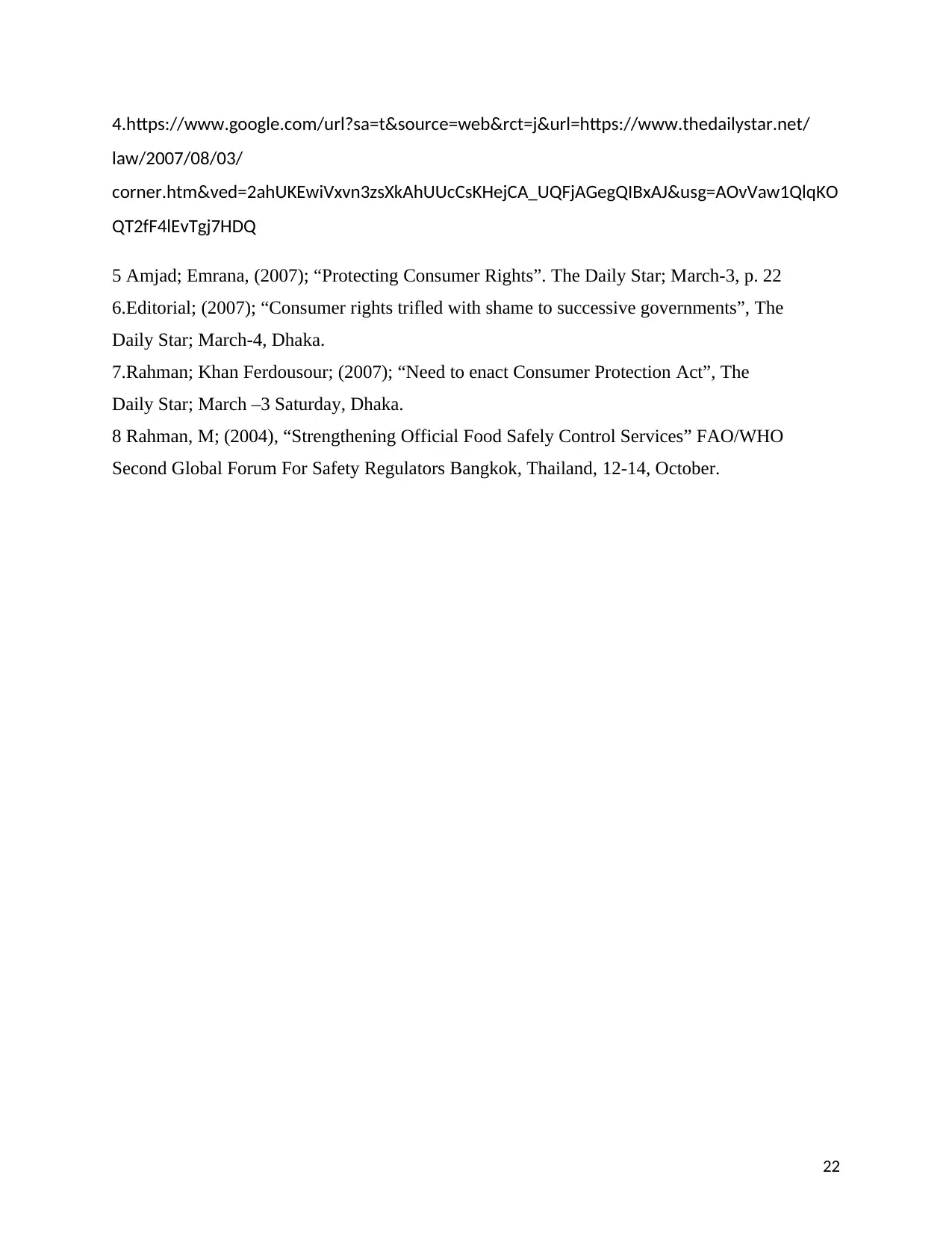
4.https://www.google.com/url?sa=t&source=web&rct=j&url=https://www.thedailystar.net/
law/2007/08/03/
corner.htm&ved=2ahUKEwiVxvn3zsXkAhUUcCsKHejCA_UQFjAGegQIBxAJ&usg=AOvVaw1QlqKO
QT2fF4lEvTgj7HDQ
5 Amjad; Emrana, (2007); “Protecting Consumer Rights”. The Daily Star; March-3, p. 22
6.Editorial; (2007); “Consumer rights trifled with shame to successive governments”, The
Daily Star; March-4, Dhaka.
7.Rahman; Khan Ferdousour; (2007); “Need to enact Consumer Protection Act”, The
Daily Star; March –3 Saturday, Dhaka.
8 Rahman, M; (2004), “Strengthening Official Food Safely Control Services” FAO/WHO
Second Global Forum For Safety Regulators Bangkok, Thailand, 12-14, October.
22
law/2007/08/03/
corner.htm&ved=2ahUKEwiVxvn3zsXkAhUUcCsKHejCA_UQFjAGegQIBxAJ&usg=AOvVaw1QlqKO
QT2fF4lEvTgj7HDQ
5 Amjad; Emrana, (2007); “Protecting Consumer Rights”. The Daily Star; March-3, p. 22
6.Editorial; (2007); “Consumer rights trifled with shame to successive governments”, The
Daily Star; March-4, Dhaka.
7.Rahman; Khan Ferdousour; (2007); “Need to enact Consumer Protection Act”, The
Daily Star; March –3 Saturday, Dhaka.
8 Rahman, M; (2004), “Strengthening Official Food Safely Control Services” FAO/WHO
Second Global Forum For Safety Regulators Bangkok, Thailand, 12-14, October.
22
1 out of 22
Related Documents
Your All-in-One AI-Powered Toolkit for Academic Success.
+13062052269
info@desklib.com
Available 24*7 on WhatsApp / Email
![[object Object]](/_next/static/media/star-bottom.7253800d.svg)
Unlock your academic potential
© 2024 | Zucol Services PVT LTD | All rights reserved.





